Vue lecture
Hindustan Times: Ukraine found India-linked electronics in Russia’s Shahed drones
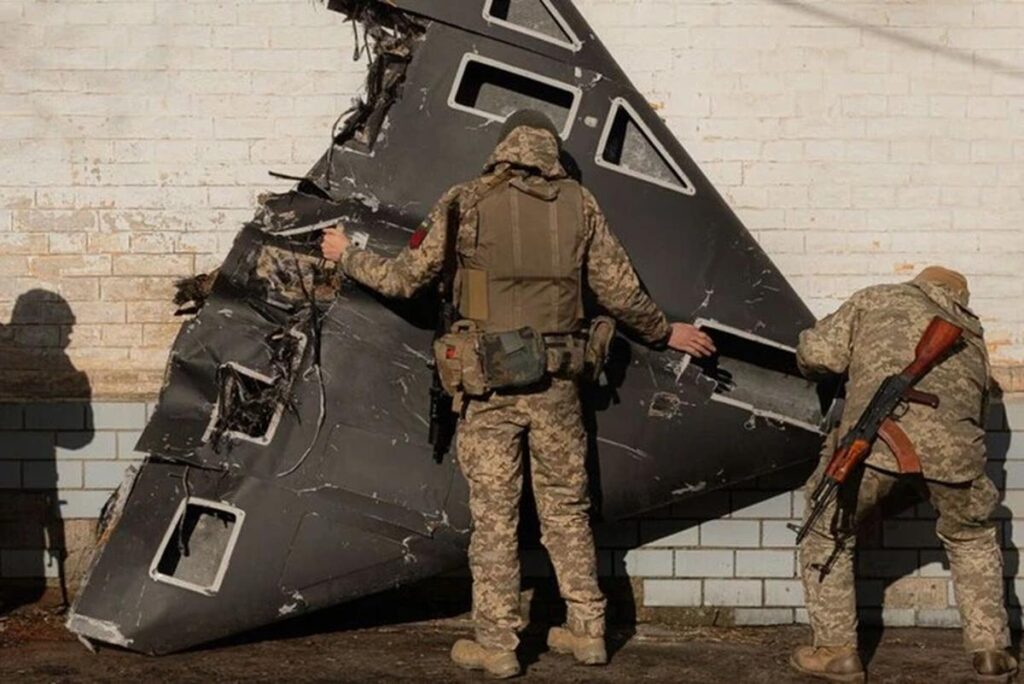
Ukraine has discovered Indian electronics in Iranian-designed Shahed drones used by Russian forces to attack civilian areas. Indian media report that Kyiv raised the issue with both India and the EU, citing specific Indian-made components embedded in these weapons.
Ukraine flags Indian electronics in Russian drones
Hindustan Times reports that Ukrainian authorities identified parts made or assembled in India inside Shahed 136 unmanned combat aerial vehicles (UCAVs). These drones have been used by Russia in mass strikes on Ukrainian cities since 2022.
According to the documents reviewed by the outlet, a Vishay Intertechnology “bridge rectifier E300359” assembled in India was found in the drone’s voltage regulator. A signal generator chip AU5426A by Aura Semiconductor was located in the satellite navigation system.
The report states that Ukraine raised the issue with India’s external affairs ministry on at least two occasions. Ukrainian diplomats also brought it up with EU sanctions envoy David O’Sullivan during his mid-July visit to New Delhi.
India’s foreign ministry responded that its dual-use exports follow international non-proliferation rules and domestic regulations. Vishay Intertechnology did not respond to the paper’s request for comment.
Aura Semiconductor, whose AU5426A chip was identified in the drones, said in a statement that it complies fully with export control laws and is “deeply disturbed” by the possibility of its components being misused. It added that its chip is plug-and-play, making user tracing difficult, and that an internal audit yielded no conclusive findings.
India says electronics was exported to West Asia
Hindustan Times cites unnamed sources saying some Indian components were legally exported to West Asia, then diverted to Russia or Iran.
Ukraine’s HUR defence intelligence agency has also found electronics from US and Chinese firms in Russian weapons.
Ajay Srivastava from the Global Trade Research Initiative told Hinndustan TImes that tracing dual-use items post-export is almost impossible, and said better exporter awareness is needed. He warned that no export control system can guarantee full oversight once items cross national borders.
Read also
-
Panama just slammed the door on Russia’s shadow fleet — tankers over 15 years old now blacklisted
-
Netherlands becomes first NATO country to buy US Patriot missiles for Ukraine
-
Delhi turns to American, Canadian, and Emirati oil suppliers amid Western pressure
-
India helps Russia to increase Ukrainian civilian death rate with octogen explosives exports worth $1,5 million
Panama just slammed the door on Russia’s shadow fleet — tankers over 15 years old now blacklisted

Panama has banned oil tankers and bulk carriers over 15 years old from registering under its flag. This move will directly impact vessels linked to Russia’s shadow fleet. The Panamanian Maritime Authority (AMP) announced the decision on 1 August 2025 to reduce detentions and prevent non-compliant ships from what is called the “ghost fleet” from entering the registry.
Panama enforces age cap to block risky vessels
The Panamanian Ship Registry updated its regulations to exclude tankers and bulk carriers aged over 15 years. According to AMP, the move aims to improve operational standards and limit the risks associated with older vessels. The registry update is part of the revised MMN 11/2024 directive, which defines the Precheck process for flagging eligibility.
A key element of the Precheck involves evaluating risks tied to sanctions and vessel operations. The General Directorate of the Merchant Marine found that between 2023 and mid-2025, 71% of all ship detentions involved older oil tankers, bulk carriers, or general cargo ships.
Panama’s registry, holding the Guinness World Record for the largest number of registered vessels, is taking additional steps to ensure compliance.
Authorities will now require extra inspections every three months for vessels classified as deficient. These checks will be conducted by the Recognized Organization responsible for issuing statutory certificates. In addition, there will be further verification of the Ship’s Safety Management System (SMS Certificate), particularly if non-conformities are detected.
The AMP stated the changes are meant to reduce detentions and increase overall safety. While the announcement did not name Russia directly, it referred to the so-called “ghost fleet” — a term widely used for Russia’s shadow fleet of old tankers used to bypass sanctions and transport oil covertly.
India holds up mirror to West: Stop your Russian oil deals before demanding ours

Ukraine’s allies continue flowing billions of dollars into oil trade with Russia. The Indian government, in response to US President Donald Trump’s ultimatum, which threatens secondary sanctions against countries importing Russian energy, says that “the very nations criticizing India are themselves indulging in trade with Russia.”
“India’s imports are meant to ensure predictable and affordable energy costs to the Indian consumer… It is revealing that the very nations criticizing India are themselves indulging in trade with Russia,” says the Indian government.
The West keeps trading with Russia: The numbers are striking
India points to the Western blatant double standards.
- In 2024, EU–Russia trade in goods reached €67.5 billion.
- In 2023, services trade totaled €17.2 billion.
- In 2024, Europe imported a record 16.5 million tonnes of Russian LNG, the highest volume since 2022.
Many critical Russian exports remain unsanctioned, including:
- Palladium for the US auto industry
- Uranium for nuclear power plants
- Fertilizers, chemicals, metals, machinery, and equipment, all of which the US continues to import from Russia.
India rejects restrictions
India emphasizes that its decisions are driven by economic necessity, not political alignment.
New Delhi is ready to defend its energy security, even if new sanctions are imposed.
“The targeting of India is unjustified and unreasonable. Like any major economy, India will take all necessary measures to safeguard its national interests and economic security,” the Indian government claimed.
Effectively, India has held up a mirror to the US and Europe: stop your own trade with Russia before demanding the same from others.
Ukraine wins historic $5 billion award against Russia—and Europe starts making Moscow pay it
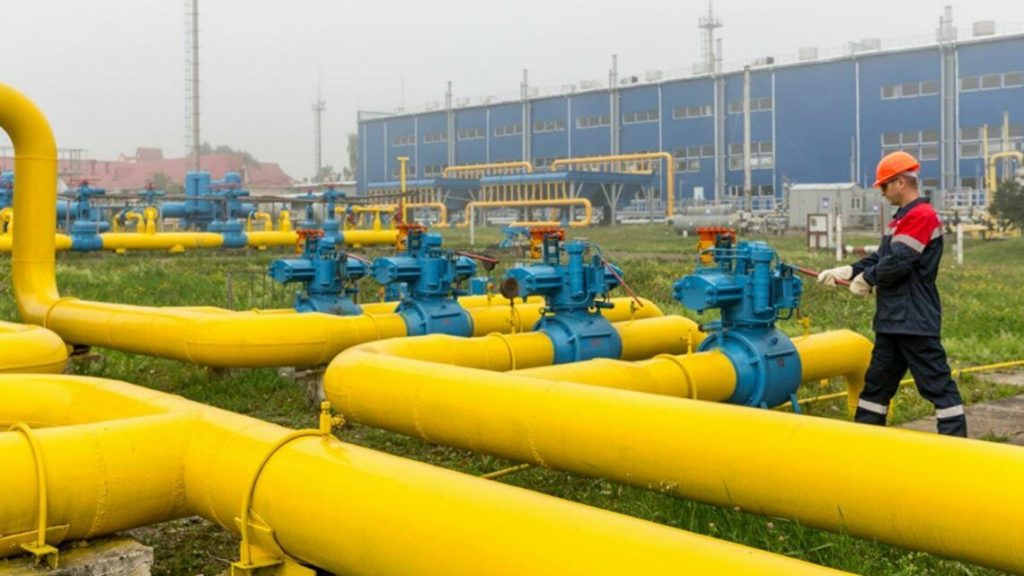
Russia will pay. Ukraine’s national energy company, Naftogaz, has announced it has received official approval from the Vienna District Court to initiate forced enforcement of the largest arbitration award against Russia, worth over $5 billion.
Due to the Kremlin’s refusal to pay voluntarily, Naftogaz has launched procedures to seize Russian assets worldwide.
A blow to Russia in the heart of Europe
Based on the Austrian court decision, more than 20 pieces of Russian state-owned real estate in Vienna have been seized, with a total value exceeding €120 million.
These assets will be sold, and the proceeds transferred to Ukraine as part of the compensation awarded in The Hague.
“This is another practical step towards collecting over $5 billion from Russia for the illegal seizure of Naftogaz Group’s assets in Crimea. Russia will pay for everything,” says Naftogaz CEO Serhii Koretskyi.
Arbitration in action
Naftogaz is represented in Austria by the DORDA law firm. The team includes partner Alexander Karl, lead counsel Robert Keimmelmayr, and Therese Stingl.
The seized property includes shares in gas pipelines, equipment, licenses for subsoil use, and over 675 million cubic meters of gas in underground storage, all of which Russia seized during the occupation of Crimea.
Naftogaz was a key player in Crimea’s gas market, responsible for exploration, production, transportation, processing, and distribution of gas.
Read also
Drone attack hits Russia’s Rostov Oblast—fire breaks out near railway station
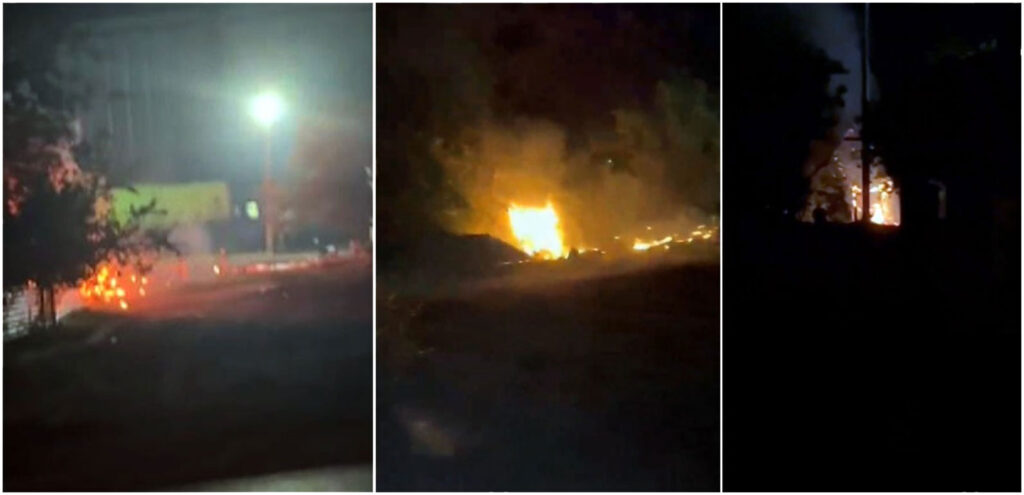
A fire broke out at a railway in southern Russia’s Rostov Oblast overnight on 5 August after a reported drone attack. Local footage geolocated by independent analysts shows flames near the Tatsinskaya station and nearby infrastructure. Russian officials claim the attack was repelled. The station is located 250 km behind the lines.
Fire confirmed near railway in Rostov Oblast after drone strike
Ukrainian Telegram channels Supernova+ and Exilenova+ reported that a fire occurred near the Tatsinskaya station in Rostov Oblast following a drone strike. According to Supernova+, the intended target may have been a fuel train, but the impact ignited grass instead. The video shared by Supernova+ shows fire in the vicinity of the station and a local grain elevator.
The Russian Ministry of Defense claimed that 24 drones were downed overnight across four regions, including seven over Rostov Oblast. It alleged that 13 UAVs were destroyed over Bryansk Oblast, two over Kaluga Oblast, and two over Smolensk Oblast.
Russian news Telegram channel Astra cited local residents who reported a fire in the Tatsinskaya area after the strike. Astra geolocated footage of the incident, identifying the red water tower and the grain elevator visible at the railway site.
Officials downplay incident as fire
Yurii Slyusar, acting governor of Rostov Oblast, stated that Russian forces allegedly repelled a mass air attack in several districts, including Millerovsky, Chertkovsky, Tatsinsky, and Belaya Kalitva. He claimed that an electric substation in Verkhnetalovka, Millerovsky district, had burned and that the 500-square-meter blaze had been put out.
Read also
Lozova’s worst drone strike: Russia kills railway worker, injures teenagers
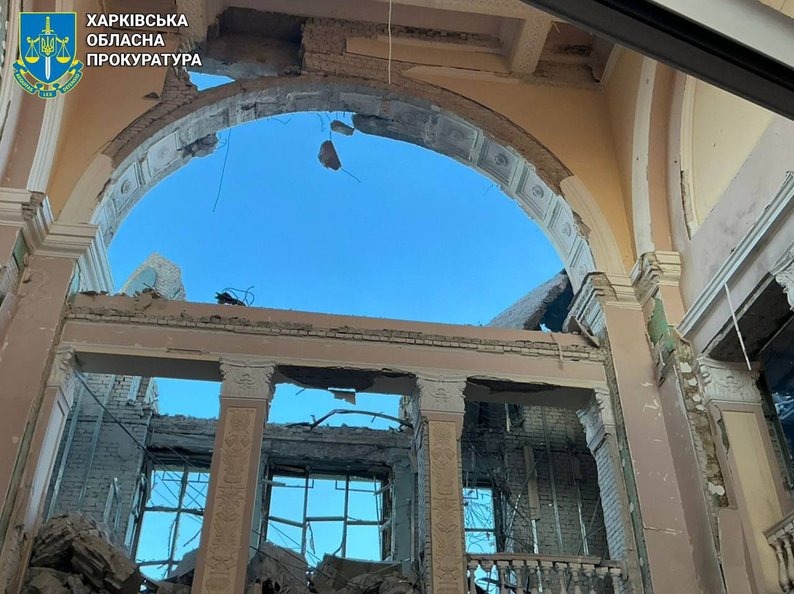
Russia’s Lozova drone strike killed a railway worker and injured civilians, including two teenagers, during Russia’s heaviest drone and missile attack on the city since the start of the full-scale war. According to the Ukrainian Air Force and local officials, the assault overnight on 5 August 2025 involved 46 Shahed-type and decoy UAVs, and a ballistic Iskander-M missile.
Russia targets Lozova with 46 drones and a missile
The Ukrainian Air Force reported that from 19:00 on 4 August, Russia launched an air attack from the directions of Kursk, Bryansk, Oryol, and Primorsko-Akhtarsk in Russia, using Shahed drones, UAV decoys of various types, and an Iskander-M missile from Bryansk Oblast.
Ukraine’s air defenses, including aviation, anti-aircraft missile units, electronic warfare, and mobile fire groups, intercepted or suppressed 29 drones by 08:00.
“Hits from 17 drones were recorded in the eastern direction, as well as one ballistic missile, and debris from downed drones fell in three locations in the southern and northeastern directions,” the Air Force wrote.
Railway worker killed, children injured in Lozova
In Lozova, Kharkiv Oblast, a massive drone strike killed one person and injured others, local authorities reported. The mayor of Lozova, Serhii Zelenskyy, said that critical infrastructure, high-rise buildings, detached houses, and an educational institution were damaged. He noted that emergency services, medics, and rescue workers were operating on site and that restoration of water supply was underway.
Zelenskyy added that parts of the city remained without power, including Avylivka and the Katerynivskyi district. Public transport routes were also affected.
Rail station damaged, fires reported, transport disrupted
Images released by the Kharkiv Oblast Prosecutor’s Office show damage at the Lozova railway station, including a collapsed roof. The station was temporarily closed, and changes were introduced to suburban train services, the city council and Ukrzaliznytsia reported.
Trains Nos. 66/65 and 166/165 on the Uman–Cherkasy–Kharkiv route were redirected via an alternate path. Passengers to and from Lozova were being transported by bus to the Paniutyne station. Ukrzaliznytsia warned of delays of up to one hour due to use of a reserve locomotive.
According to the State Emergency Service, six fires broke out in Lozova as a result of the drone strike. Destruction of other buildings was also recorded.
The Kharkiv Oblast Prosecutor’s Office clarified that Russia has used over 30 Shahed-type attack drones — for some reason, the Kharkiv local authorities and prosecutor’s office always refer to them as “Geran-2” by their Russian designation.
Read also
-
Nightly assaults become routine as Russian drones swarm Ukrainian skies, injuring civilians
-
Damaged but still stands: Russians bombed vehicular bridge in Kherson
-
Death toll from yesterday’s Russian air assault on Kyiv reaches 31 with a 2‑year‑old among victims as city mourns
-
Kharkiv bleeds daily under Russian fire as €10 billion in damage leaves 160,000 homeless
Trump to Create Task Force for L.A. Olympics on Security

© Mike Blake/Reuters
Russia Says It Will Stop Abiding By INF Treaty

© Pool photo by Evgenia Novozhenina
Judges Openly Doubt Government as Justice Dept. Misleads and Dodges Orders

© Craig Hudson for The Washington Post, via Getty Images
New Russian 9M729 missile threat just brought world back to Cold War era
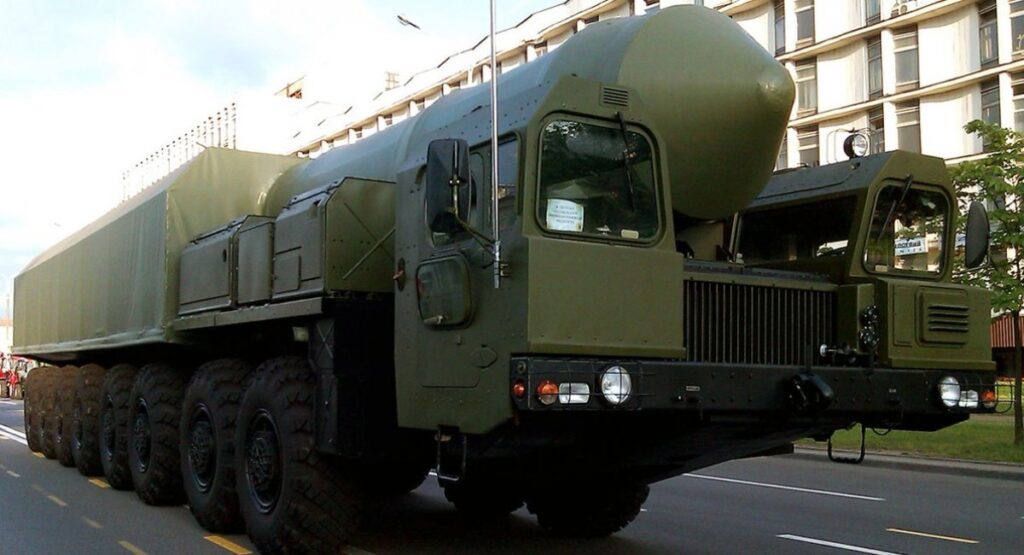
The Kremlin again threatens Europe with missiles. The Russian Foreign Ministry has announced that the country is lifting its self-imposed restriction on the deployment of land-based ballistic and cruise missiles with a range between 500 and 5,500 km, according to Radio Free Europe/Radio Liberty.
Once-banned missiles are back on the table. In 1987, the US and USSR agreed to eliminate all missiles of this class, but in 2019, the treaty formally expired. After that, Russian President Vladimir Putin claimed Russia would not be the first to deploy such missiles unless the US did so first.
Now, Moscow reverses course: it has lifted the restriction, blames the West, and claims a threat from American missiles in Europe and the Asia-Pacific region. The official reason: “steps by the collective West” that, according to the Kremlin, “destabilize the situation in border regions.”
“The Russian Foreign Ministry acknowledges the disappearance of conditions for maintaining the unilateral moratorium on the deployment of such weapons,” the statement says.
The US and NATO: Russia lied and violated the moratorium
Western states already claimed in 2019 that Russia had de facto violated the agreement — the main evidence being the 9M729 missile system, which, according to the US and NATO, has a range exceeding 500 km.
Moscow denies it, but reality suggests otherwise: the missiles exist, and now the Kremlin officially admits it is ready to deploy them. This move threatens to spark a new arms race and escalate security risks not only for Ukraine but for all of Europe.
Russia unleashes 9M729 “Oreshnik” missile on Dnipro in 2024
In November 2024, Russia launched a 9M729 missile at the city of Dnipro, marking the first confirmed combat use of the controversial system, also known by the codename “Oreshnik”. The missile was equipped with six warheads, each capable of independent targeting. The extent of damage remains undisclosed.
Read also
-
HUR: Explosion plunges Russian military repair base in Berdiansk into darkness
-
Zelenskyy: Sanction loopholes allow Russia to continue producing its “Oreshnik” intercontinental ballistic missiles with Western tech
-
New Russian 9M729 missile threat just brought world back to Cold War era
-
Defense Intelligence of Ukraine reveals details of ballistic missile used by Russia on Dnipro
India says additional U.S. tariffs over Russian oil purchases are ‘unjustified and unreasonable.’

© Sumit Dayal/Bloomberg
Russian Nuclear Submarine Base Was Damaged in Earthquake, Satellite Images Show

© Pavel Korolyov/Agence France-Presse — Getty Images
Ukrainian sappers to train at Middle East mine action school with funding from Paris
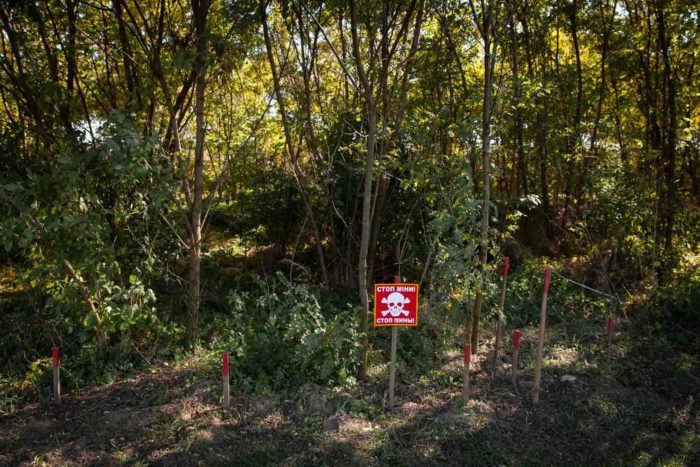
Ukraine will take another step toward the safe de-occupation and clearing of war remnants. On 4 August, Ukraine’s Ministry of Defense announced that sappers from the Ukrainian Armed Forces and the State Special Transport Service will be trained at the Regional School for Humanitarian Demining at the Lebanese Mine Action Center.
As of August 2025, Ukraine is the most mined country in the world. Official data shows that over 139,000 square kilometers of Ukrainian territory are potentially contaminated with mines and explosive ordnance, amounting to nearly 40% of the entire country.
The program will be funded by the French government. Lebanon was chosen due to its extensive experience in post-conflict land clearance.
“We thank the Government of the French Republic and the French people for their support in the fight against the Russian aggressor,” says Colonel Ruslan Berehulia, head of the Main Department for Mine Action.
Ukraine and France agree on new cooperation areas
Agreements were reached during a Ukrainian delegation’s visit to France, where Defense Ministry representatives met with:
- Yves Marek, Ambassador for Mine Action
- Jean-Yves Siffreant, technical expert
- Emmanuel Aubry, Prefect of Haut-Rhin
They discussed:
- Risks of soil contamination by explosive remnants and chemical warfare agents
- Methods for assessing contamination levels
- Approaches to high-quality demining and monitoring residual threats
France to continue logistical and technical assistance
The French side confirmed its ongoing commitment to support Ukraine not only financially, but also through:
- Knowledge exchange
- Technical equipment
- Systematic approaches to mine action
This partnership strengthens Ukraine’s ability to clear liberated territories and reduce civilian risks in the long term.
University of Virginia Appoints Interim President After Ouster
Germany raids company which secretly sent 20 machines to Russia for munitions production, despite Ukraine’s warnings
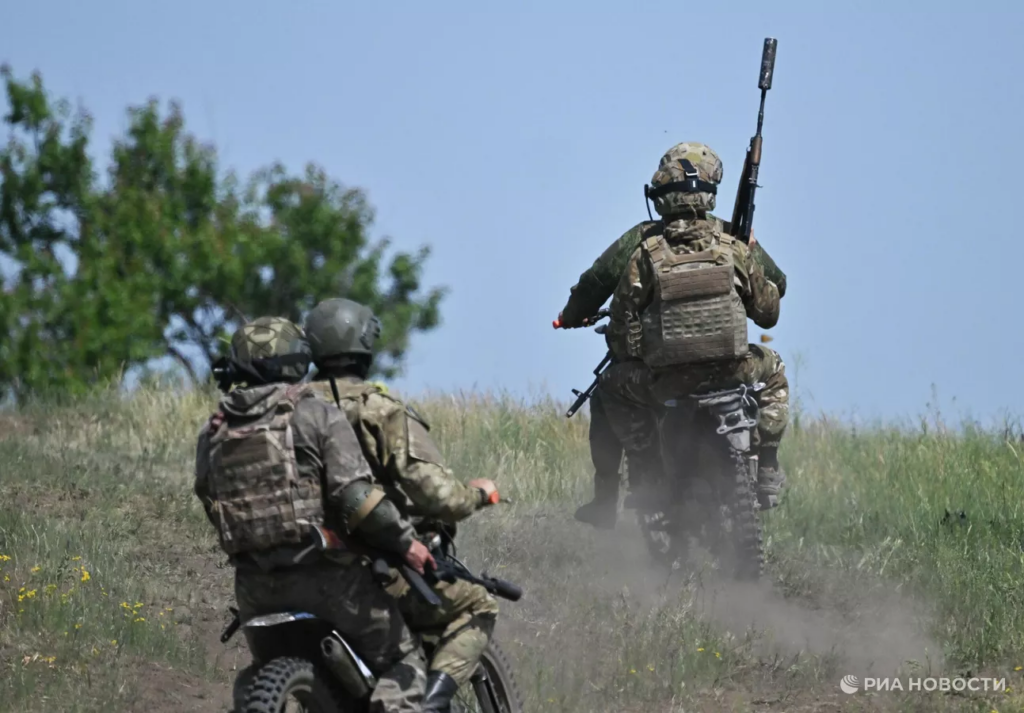
Some 140 German investigators have conducted large-scale raids at Spinner, a high-precision machine tool manufacturer suspected of knowingly supplying equipment to Russia’s military industry. Three individuals have already been charged with violating sanctions.
In 2023, Ukrainian anti-corruption bodies urged German authorities to halt exports of Spinner’s high-precision machines to Russia via Türkiye. One such CNC machine was reportedly produced for a Russian factory producing high-explosive fragmentation shells for use in Ukraine.
German law enforcement searched Spinner Werkzeugmaschinenfabrik GmbH’s offices in several German cities and abroad. Eight prosecutors were involved in the investigation.
According to the investigation, the company may have knowingly sold 20 machines to Russia for a total of €5.5 million, despite the sanctions.
Sanctions evasion is a criminal offense in the EU
Despite the company’s claims about “compliance systems” and “lack of knowledge” about the end user, investigators say otherwise. Sources indicate the deliveries may have gone through third countries, particularly Turkiye, Bloomberg reports.
“Sanctions enforcement must work like this — with documents, equipment seizures, and court proceedings,” experts say.
Circumventing sanctions is now a criminal offense in the EU, meaning those found guilty could face prison time, not just fines.
The Texas Redistricting Fight, Explained

© Jordan Vonderhaar for The New York Times
Delhi turns to American, Canadian, and Emirati oil suppliers amid Western pressure
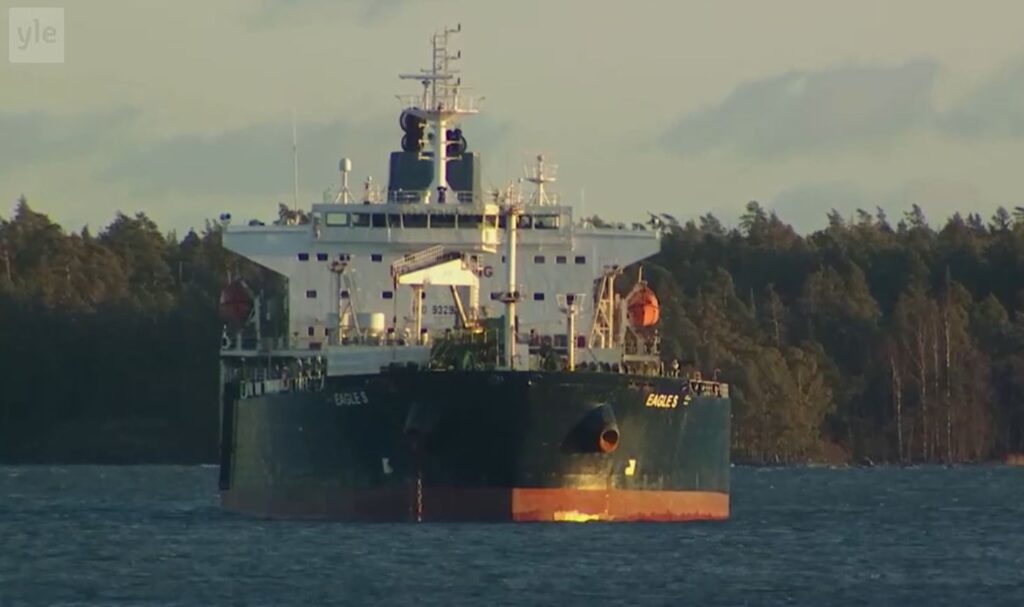
India has started buying American, Canadian, and Middle Eastern oil, but has not abandoned Russian supplies. The country’s giant Indian Oil Corp has recently purchased 7 million barrels of oil, Reuters reports.
Russia remains India’s main oil supplier, accounting for about 35% of total imports. Moscow’s energy exports remain its leading source of profits, which it uses to fund its war against Ukraine.
Indian Oil Corp strengthens supplies from the West and the Middle East
According to the latest findings, India’s largest oil refining company has bought 4.5 million barrels of American oil, 500,000 barrels of Canadian Western Canadian Select, and 2 million barrels of Das crude from Abu Dhabi. The delivery is scheduled for September 2025.
These large purchases are connected to the country’s intention to replace Russian oil due to falling discounts and new EU sanctions on Russian energy.
Sanctions pressure and trade risks
Earlier, Oil Minister Hardeep Singh Puri said India was ready to meet its oil needs from alternative sources if Russia’s supplies are affected by secondary sanctions.
In July, US President Donald Trump stated that countries continuing to buy Russian oil could face 100% tariffs if Moscow does not agree to a peace deal with Ukraine within at first, 50 days and then 10 days.
NATO Secretary General Mark Rutte confirmed that due to the new economic measures, countries, including India, could suffer losses if they continue to do business with Moscow.
Derek Dooley Enters Senate Race Seeking to Challenge Jon Ossoff in Georgia

© Donald Page/Getty Images
Frontline report: Poland’s fighter jets now scramble nightly while Russian drones test NATO’s eastern border
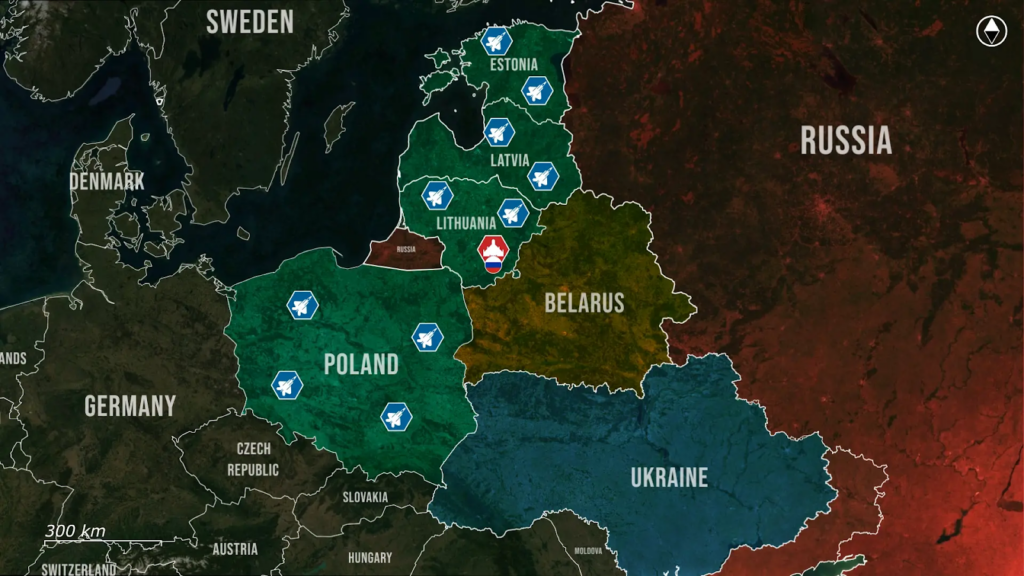
Day 1257
On 3 August, the biggest news comes from Eastern Europe.
Here, a Shahed-type drone flew directly into Lithuanian airspace and passed over the capital, marking a serious escalation in Russia’s aerial provocations against Nato’s eastern flank. Poland’s air force is already on a nightly high alert, and now the rest of the Baltics are joining in, raising what increasingly resembles an iron Curtain in the air.
Recently, a Russian Shahed-like drone crossed into Lithuanian airspace from Belarus and flew over the outskirts of Vilnius, the capital of Lithuania, close enough for civilians to see and film the device in flight. Initial fears suggested a live munition had entered Nato airspace, as Shaheds are often fitted with fragmentation, thermobaric, incendiary, or delayed-fuse warheads to cause maximum casualties and damage to civilian property.
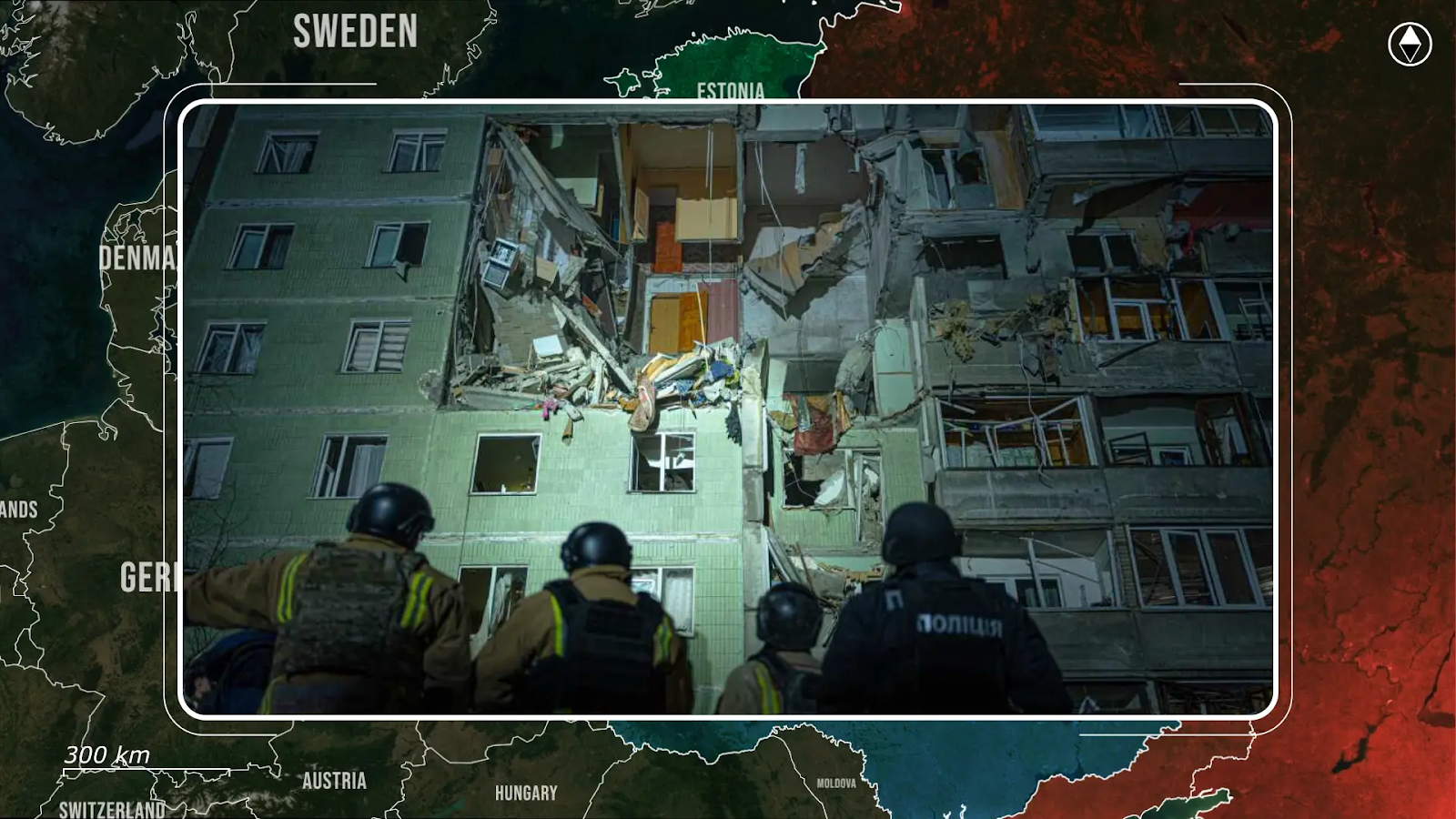
Fortunately, upon further inspection of the video footage, the object was identified as a Gerbera decoy drone, a visually similar platform Russia uses for both reconnaissance and saturation purposes during their daily strikes on Ukrainian cities.
While unarmed, the drone crossed directly over a Nato capital, far from any logical flight path to Ukraine, making it clear that this was no accident.
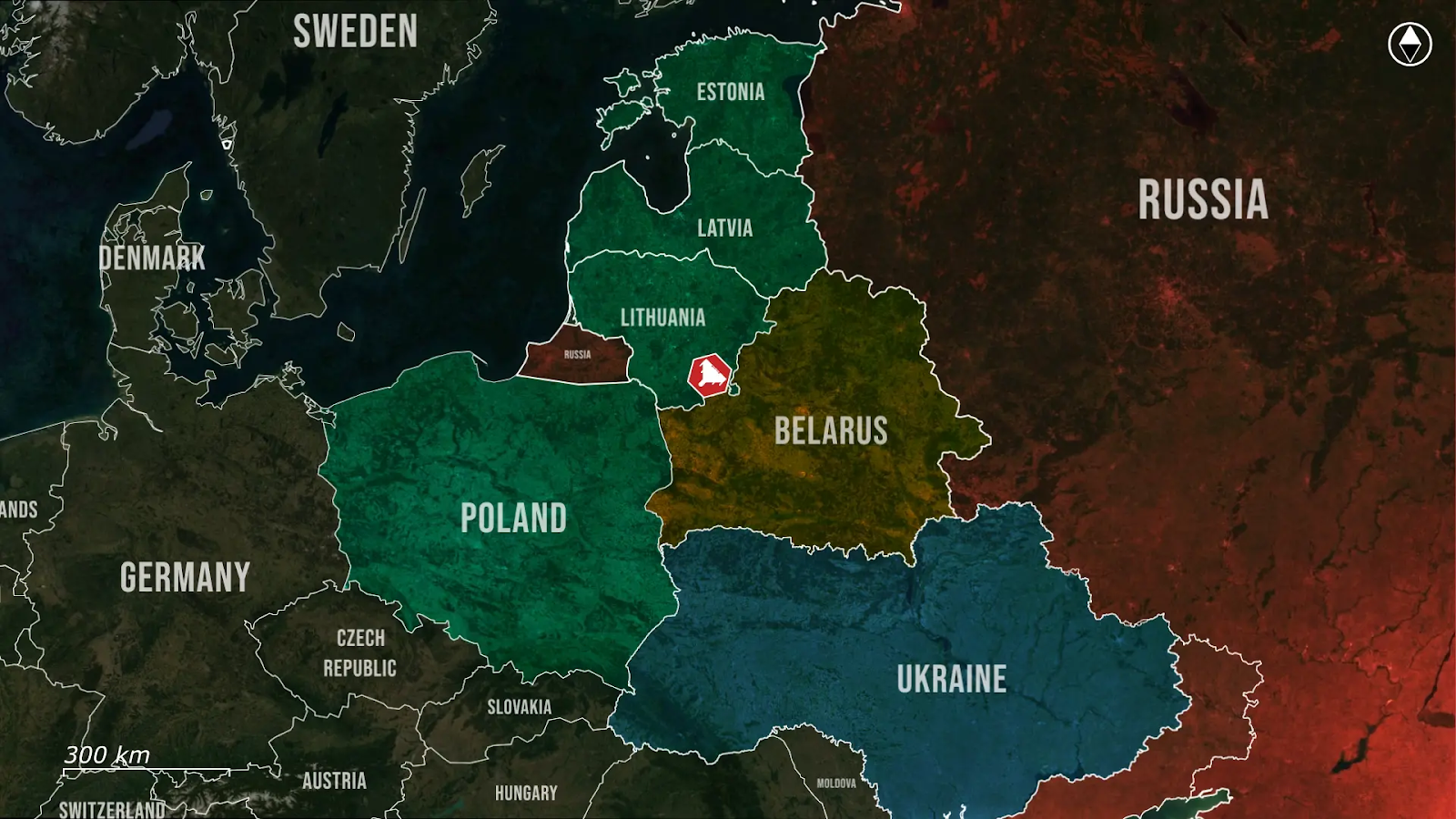
Instead, it was a calculated decision to test Nato’s reaction time, radar coverage, and political tolerance for such direct aerial threats and provocations, and critically, Lithuanian forces did not intercept.
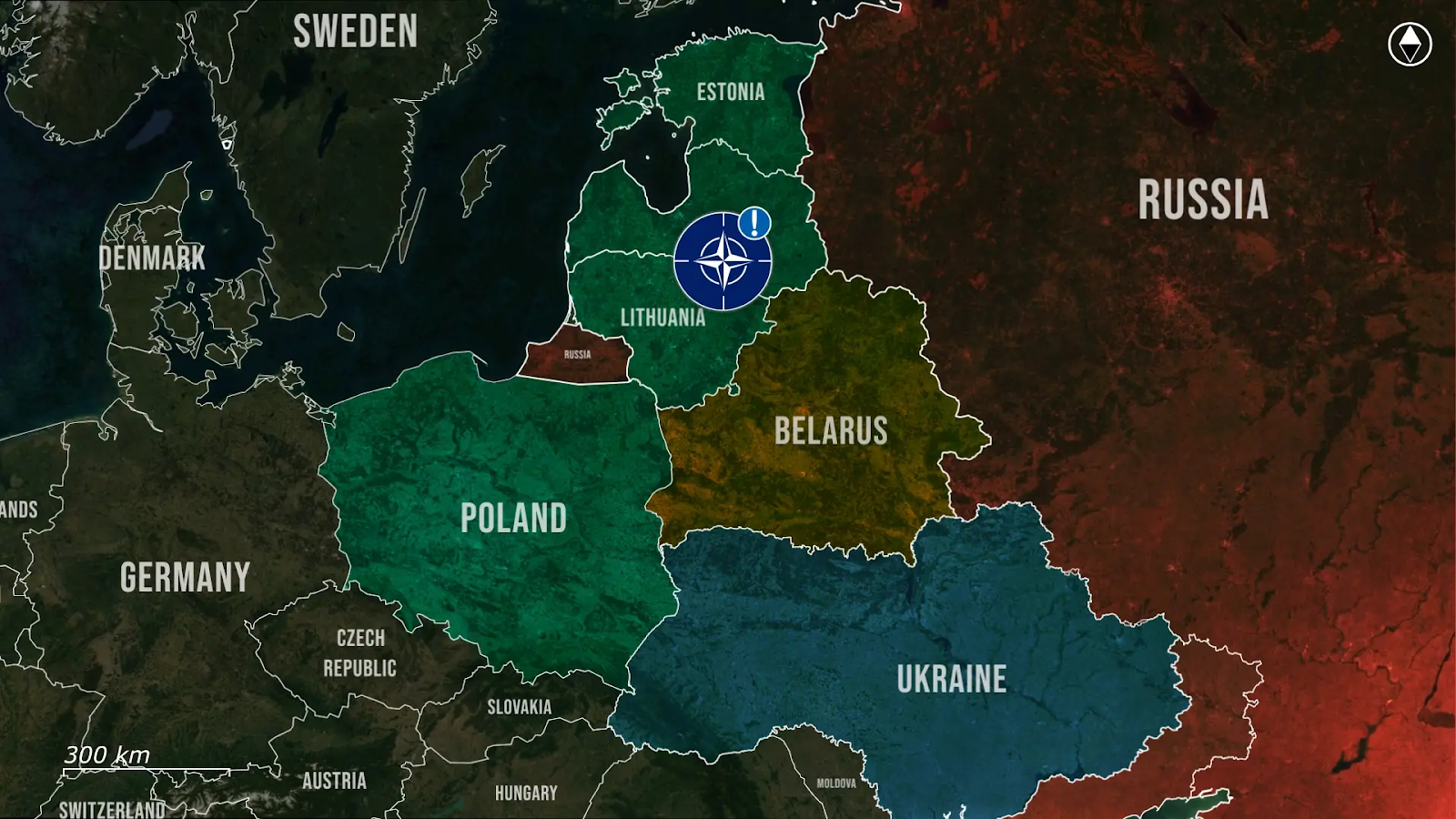
Poland, meanwhile, has entered a state of routine high alert, with Polish and Nato forces scrambling jets and raising radar systems every time Russia launches a large-scale assault on Ukraine, which happens every night and now often even during the day as well. Nato partners, including Swedish Gripens, are now joining Poland in maintaining a high alert status during Russia’s large-scale drone and missile attacks on Ukraine, reinforcing joint readiness across the eastern flank. While these alerts are precautionary, they have become the new norm, as the Polish border lies directly behind the approach paths of Russian missiles and drones targeting western Ukrainian cities. This proximity means any technical malfunction or mid-course deviation could result in a direct violation of Polish airspace, as seen in previous incidents, including when debris from Russian missiles entered Polish territory in 2022, or when a Ukrainian air defense missile landed on a Polish field, killing two farmers.
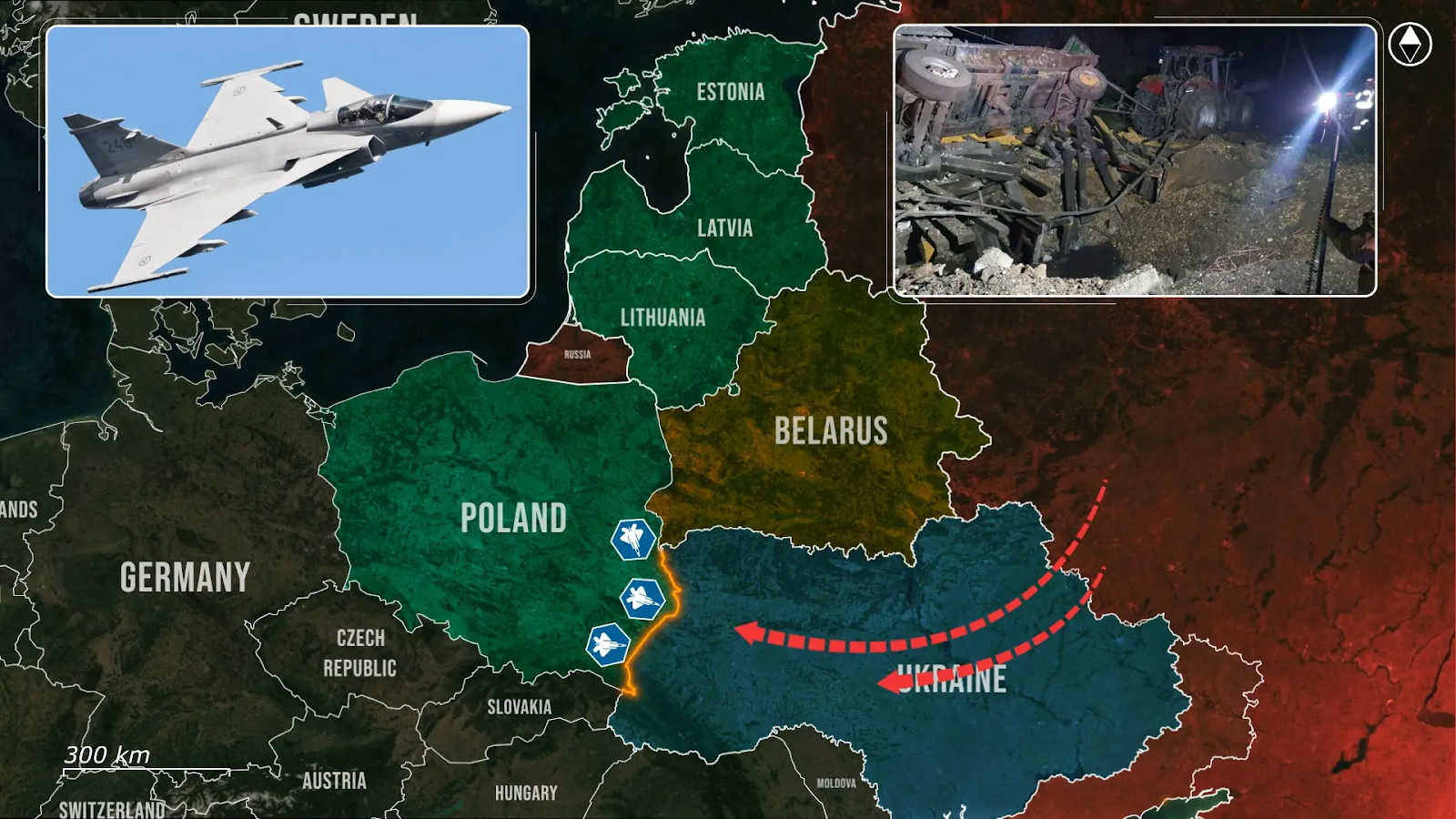
Unlike the calculated provocation over Vilnius, Poland faces a more constant strain of nightly threats, scrambling fighters, activating radar grids, and maintaining alert in civilian areas without knowing whether each launch might cause military objects to cross into its airspace. Across the Baltics, Lithuania, Latvia, and Estonia have long depended on Nato’s Baltic Air Policing mission, with Hungary, Italy, and Spain being part of the current rotation, maintaining quick-reaction alert status and integrated into Nato’s broader air defense system.
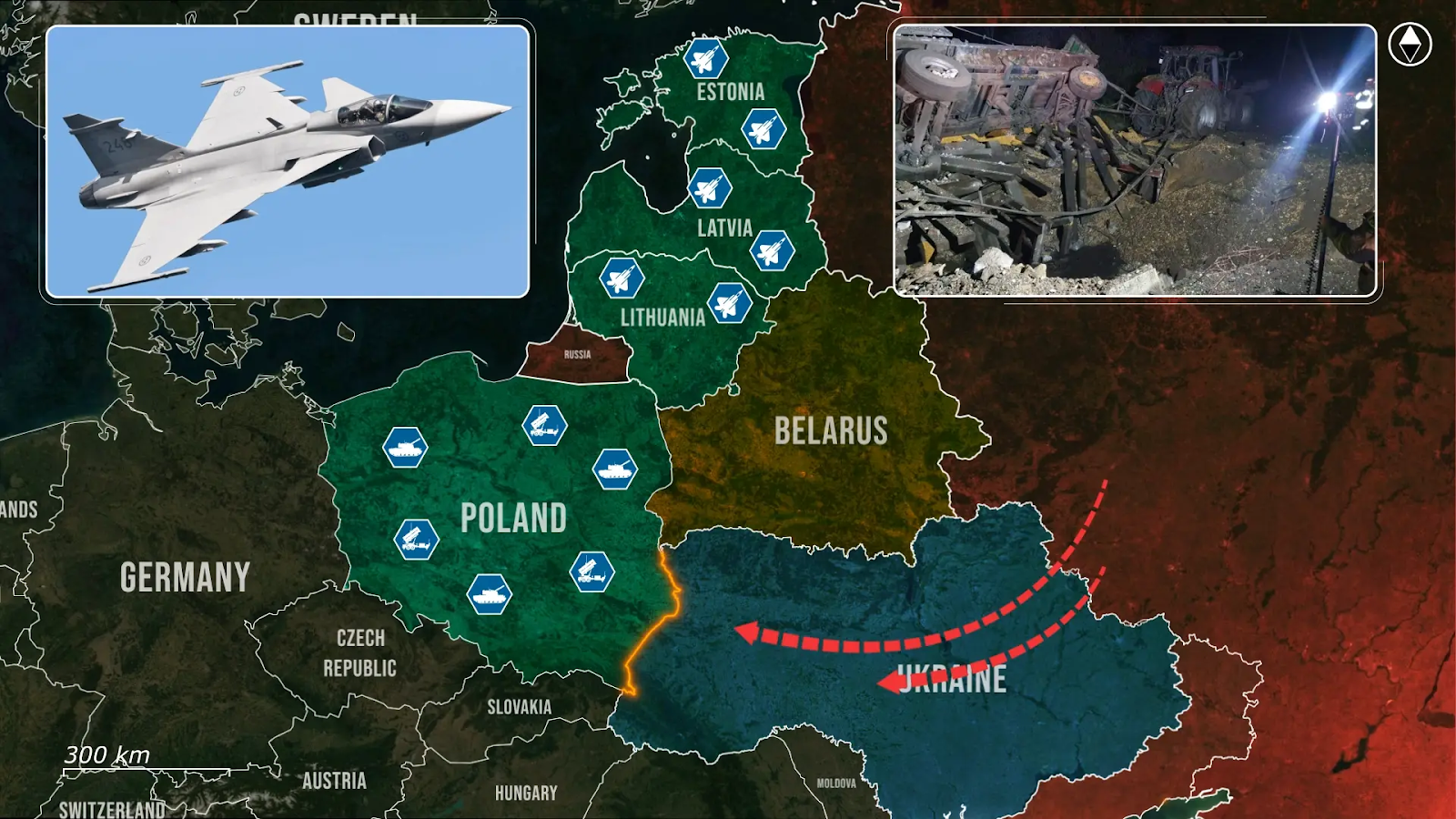
However, the unchallenged drone over Vilnius shows the limits of deterrence alone, and Lithuania is now accelerating the deployments of Ukrainian-developed acoustic drone detection systems, seeking to fill gaps in its early warning networks exposed by the most recent airspace violation.
At the same time, the Baltic states are reinforcing their readiness for both air-to-air and ground-to-air engagements by expanding joint training protocols, adapting quick-reaction procedures, and integrating new detection systems designed to counter the threat of low-flying unmanned platforms.
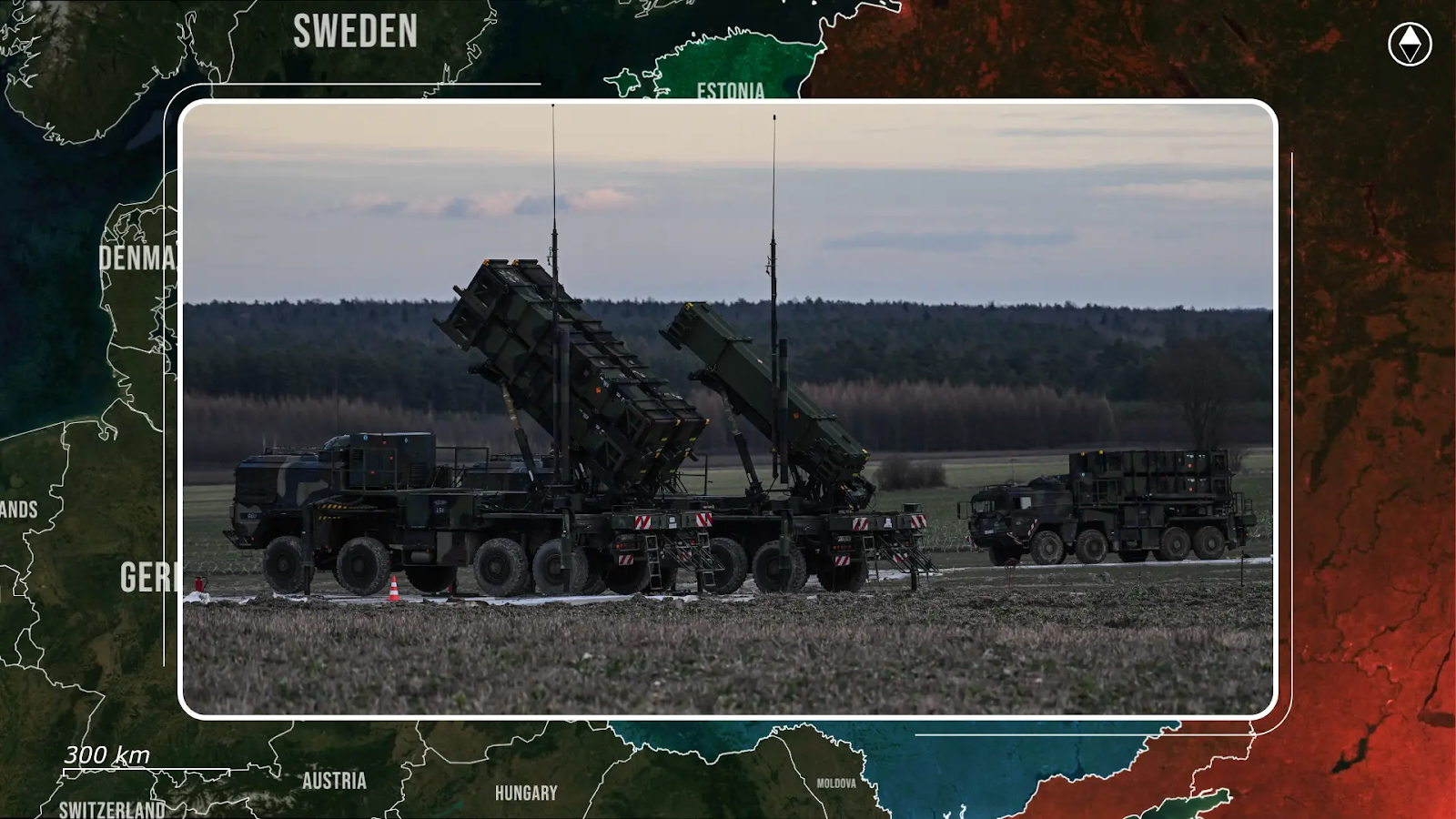
And across all three states, radar tracking, jamming incidents logs, and drone incursions are now analyzed with a single assumption: that any aerial anomaly could be the opening in a broader conflict. The emerging posture is no longer passive monitoring; with new drone detection systems, joint alert protocols, and revised civilian flight corridors, it is becoming forward-leaning, reinforced, and increasingly closed, an Iron Curtain in the air.
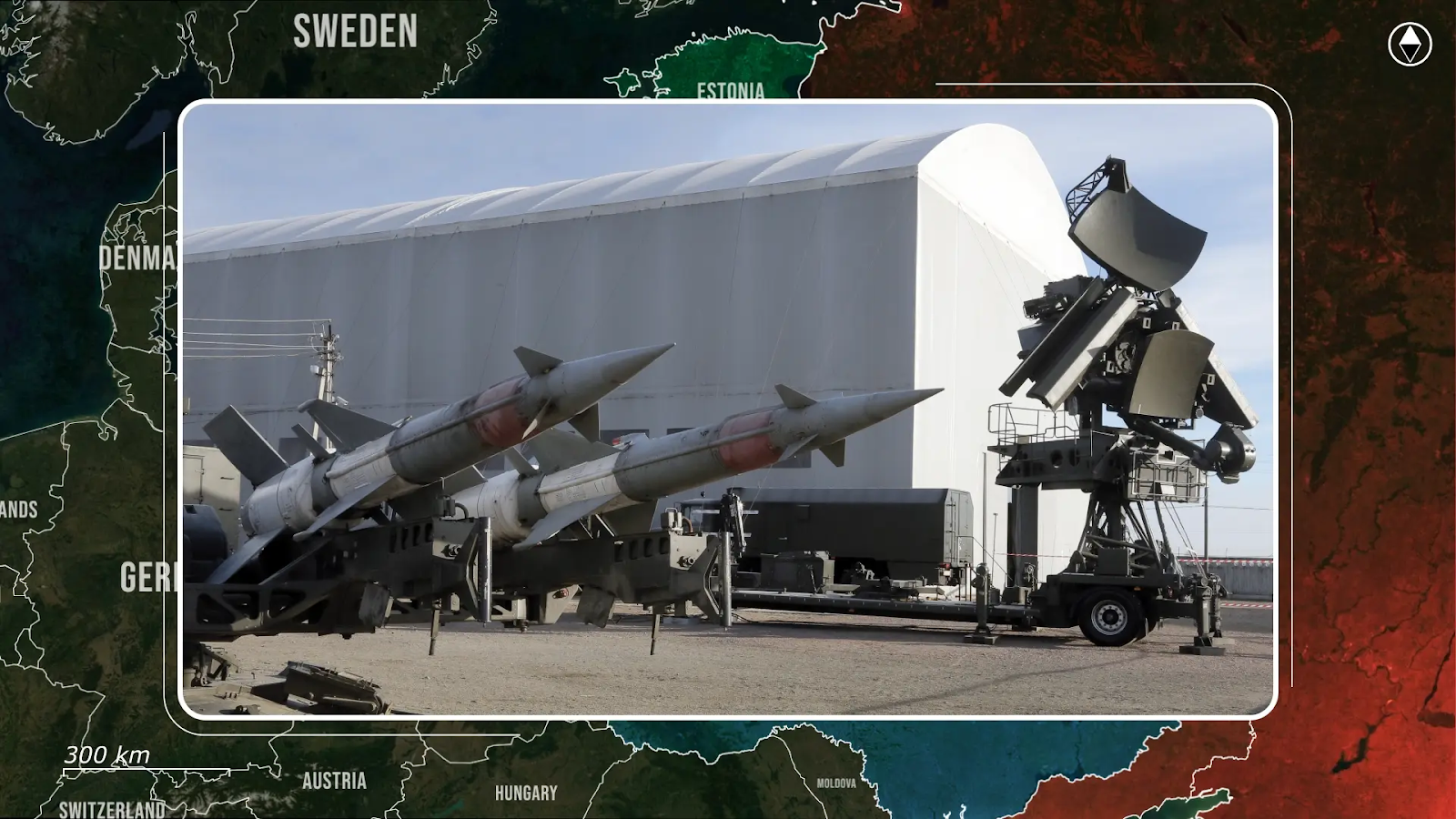
Overall, Russia’s latest airspace violations are increasingly escalating and reshaping Nato’s eastern defenses through repeated, calculated provocations that expose gaps, test thresholds, and force reaction. The incursion over Vilnius is a template for how Moscow may continue to pressure Nato’s eastern flank, trying to provoke member states into triggering an open conflict. As Poland’s nightly alerts become routine and Baltic air defenses are forced to harden, the question is no longer whether Nato will respond, but how far that response will go, and as this pattern deepens, the skies over Eastern Europe are no longer a buffer, they are becoming the front line.
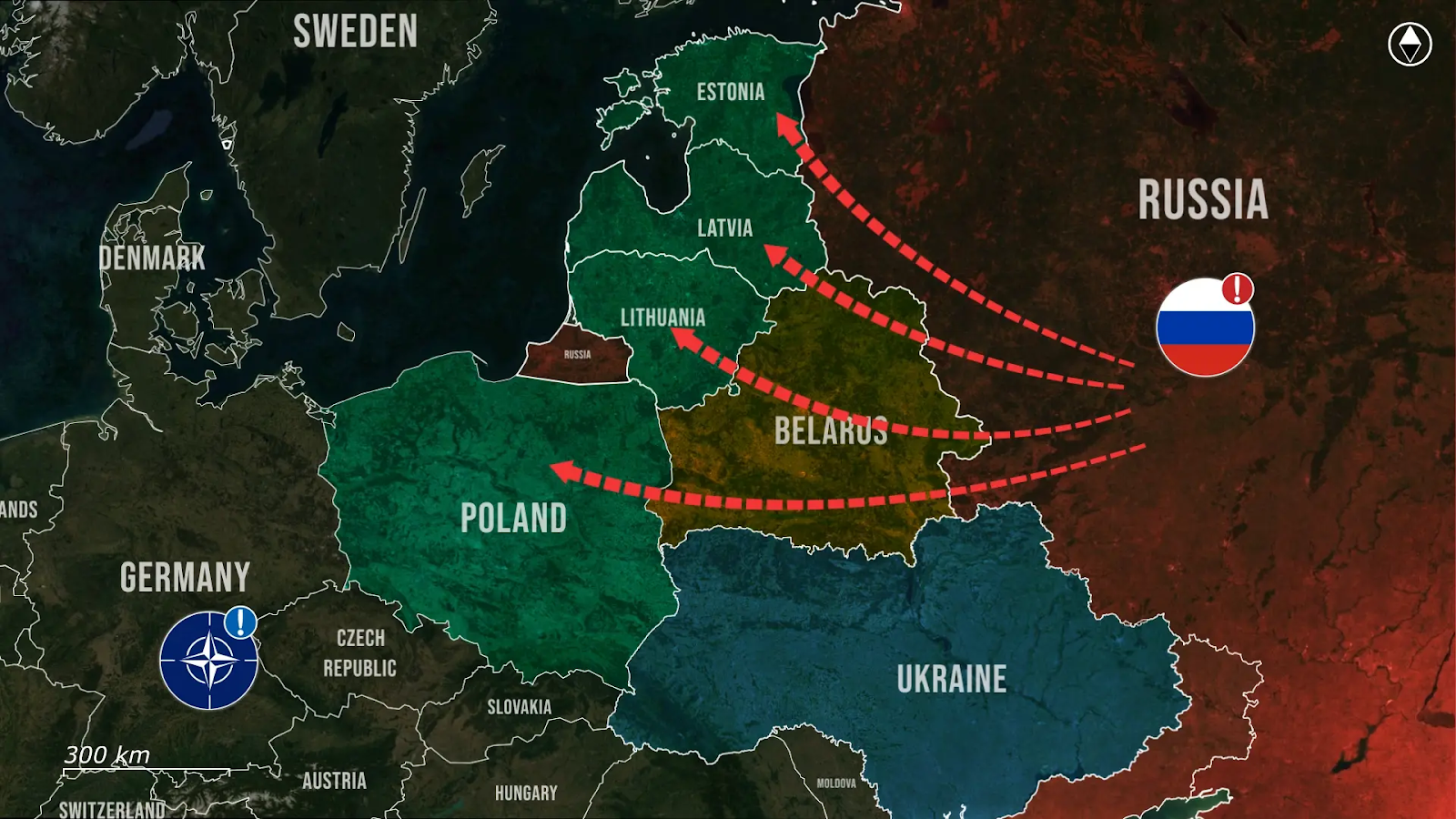
In our regular frontline report, we pair up with the military blogger Reporting from Ukraine to keep you informed about what is happening on the battlefield in the Russo-Ukrainian war
You could close this page. Or you could join our community and help us produce more materials like this.
We keep our reporting open and accessible to everyone because we believe in the power of free information. This is why our small, cost-effective team depends on the support of readers like you to bring deliver timely news, quality analysis, and on-the-ground reports about Russia's war against Ukraine and Ukraine's struggle to build a democratic society.
Become a patron or see other ways to support.
Top Trump aide says India financing Putin’s war in Ukraine by buying Russian oil
White House official says India ‘basically tied with China in purchasing Russian oil’ as Delhi defies sanctions threat

© AFP via Getty
TikTokers face $ 300 fine for filming burning Russian oil depot hit by Ukrainian drones

Authorities in Sochi detained two girls and a young man who filmed a video against the backdrop of a burning oil depot, according to the Krasnodar Oblast Ministry of Internal Affairs.
The detainees traveled to Sochi from Nizhny Tagil, the ministry reported. Officials issued a protocol against one of the detained individuals under the article concerning “failure to comply with rules of conduct in case of emergency situation or threat of its occurrence.”
This violation carries penalties ranging from a warning to fines between 1,000 and 30,000 rubles ($12-$375).
Adler oil depot in Sochi, southern Russia, burned after Ukrainian drones struck overnight on 3 August, igniting a 2,000 cubic meter fuel tank around 530 km from the frontline. The strike forced a halt to flights at Sochi airport.
Telegram channels reported, citing eyewitnesses, that approximately 20 explosions were heard in Sochi. The oil depot includes 41 tanks with a combined capacity of around 31,200 cubic meters.
What’s It Like to Deal With Brutal U.S. Tariffs? Ask Malaysia.

© Amrita Chandradas for The New York Times
Russia converts Donetsk airport into drone launch base to target Ukraine faster
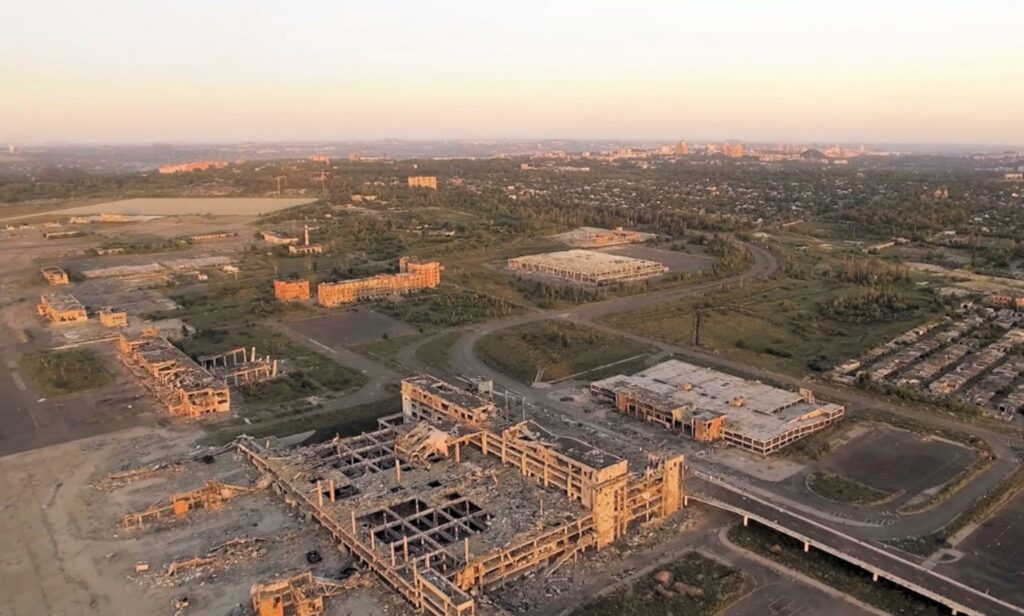
Russia is establishing drone launch infrastructure at the airport in occupied Donetsk City to reduce Ukrainian air defense reaction time, according to satellite imagery analysis by Ukrainian intelligence sources.
A Ukrainian Telegram channel reported on 2 August that July 2025 satellite images show Russian authorities have “partially cleared the fortifications on the runway and started construction work at the parking lots, possibly in preparation for the installation of fuel tanks” at the northern Donetsk City airport.
Ukrainian open-source intelligence group CyberBoroshno analyzed the imagery and reported that Russian occupation authorities are constructing “closed storage areas near the destroyed airport terminal and are preparing manual drone control points, warhead unloading areas, air surveillance posts, and a runway.”
CyberBoroshno assessed the infrastructure development aims to launch “Shahed-type strike drones, Gerbera-type decoy drones, and possibly Geran (Shahed) jet-powered drones.” The group noted that positioning launch sites closer to the frontline will reduce reaction time for Ukrainian air defenses.
The construction comes as Russia dramatically escalated drone attacks in July 2025. Russian forces fired 6,297 Shahed-type kamikaze drones and Gerbera-type decoy targets at Ukraine during the month, according to OSINT analyst Kyle Glen’s analysis of official Ukrainian Air Force reported. Glen called this figure “an absolute monthly record since the beginning of the full-scale invasion.”
The July numbers represent a 1,378% increase from July 2024, when Russia launched 426 drones. Glen said that July’s attack volume “equals the total number of drones launched over ten months of 2024 — from January through October inclusive.”
July marked the first month with more than 6,000 drones reported by Ukrainian Air Force, following June when more than 5,000 were reported for the first time, according to Glen. The analyst said that “July also had periods of relative calm when Russia held off on major launches (likely due to poor weather).”
Glen attributed the escalation to “Russia’s expansion of drone production facilities in the second half of 2024 and early 2025.” Ukrainian air defense forces now face attack volumes that “constantly increase in complexity due to evolving enemy tactics.”
The Institute for the Study of War reported that Russian forces have installed thermal imaging cameras on some Shahed drones to improve strike accuracy. Previous reports indicated Russia prepares thousands of strikes daily.
Russian forces have used occupied Ukrainian territory for long-range drone launches, and continued occupation will “increasingly threaten Ukraine and North Atlantic Treaty Organization (NATO) states,” according to the Ukrainian Telegram channel report.
Gifford Fire Burns 65,000 Acres in California’s Los Padres Forest

© U.S. Forest Service
As the Supreme Court Focuses on the Past, Historians Turn to Advocacy

© Eric Lee/The New York Times
Democratic Group Pushes Party to Embrace G.O.P. School Voucher Plan

© KC McGinnis for The New York Times
Major Russian rail hub hit: Drones strike Volgograd transport corridor, delay Moscow-St. Petersburg trains
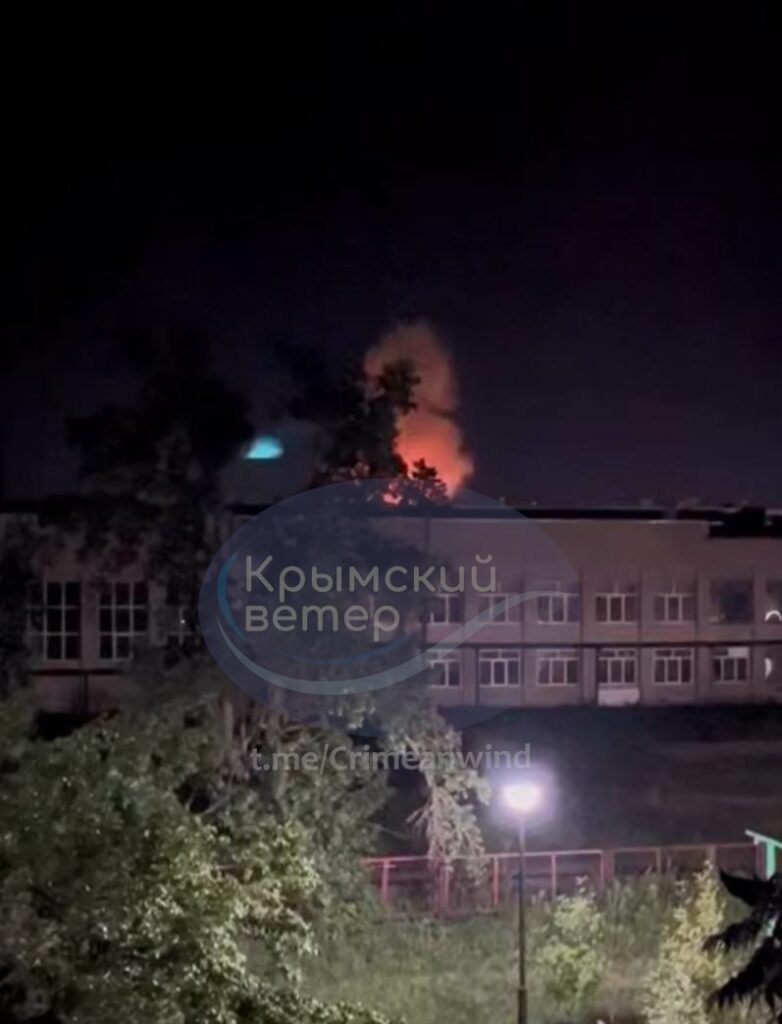
Drone attacks on transport and energy infrastructure in Russia’s Volgograd Oblast have disrupted rail traffic and power supply, with five passenger trains delayed after strikes on railway facilities in Frolovo district.
Volgograd Oblast Governor Andrey Bocharov reported what he called a “massive attack” by drones targeting transport and energy facilities across the region. The strikes caused infrastructure damage and service interruptions but resulted in no casualties.
In Frolovo, firefighters responded to a blaze at a “technical building” at Archeda railway station, according to Bocharov’s statement. The incident shattered windows in two nearby residential buildings, though passenger infrastructure at the station remained undamaged.
Railway operations faced significant disruption after an unexploded drone landed on the tracks. “To eliminate the drone that did not explode, train movement on the railway tracks is temporarily restricted, sappers are working,” Bocharov said. The Privolzhskaya Railway confirmed the suspension of train services.
Five trains experienced delays due to the disruption.
Power infrastructure also sustained damage in the Ilovlinsky district, where debris from a fallen drone severed a high-voltage power line. Energy workers are restoring electricity supply to the settlement of Ilovlya and surrounding communities, Bocharov said.
Russia’s Defense Ministry reported shooting down 61 drones during the night of 4 August. The ministry’s breakdown showed 18 drones over Black Sea waters, 12 over Voronezh Oblast, 11 over annexed Crimea, eight over Belgorod Oblast, six over Volgograd Oblast, two each over Bryansk and Rostov oblasts, and one each over Moscow Oblast and Ryazan Oblast.
Amid the ongoing Russo-Ukrainian war, Ukraine has been targeting Russia’s military, defense-industry, logistics, and fuel facilities deep inside Russia in order to cripple Moscow’s war machine. Recently, Ukraine resumed the attacks on the oil refineries and depots in Russia after a few-month pause.
Trump’s special envoy Witkoff to visit Moscow as 8 August ceasefire deadline looms
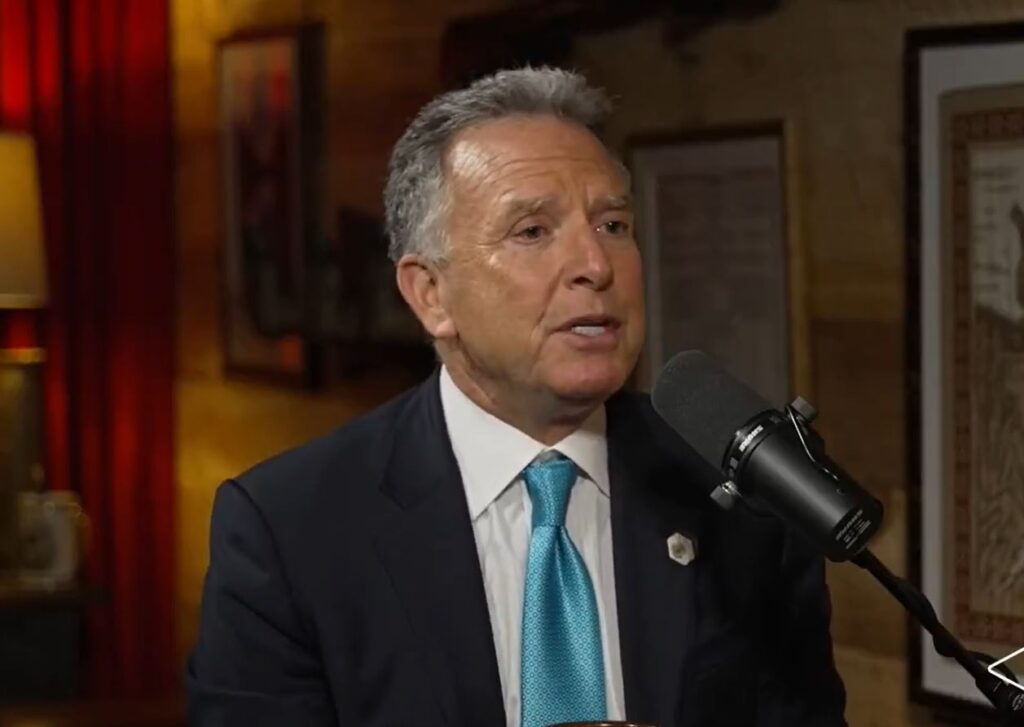
President Donald Trump announced that his Middle East special envoy Steve Witkoff will likely visit Russia on Wednesday or Thursday, according to remarks made to journalists in New Jersey reported by CBS News.
Trump told reporters that Witkoff may visit Russia “possibly on Wednesday or Thursday” (6-7 August). The president added that the Russians “asked for a meeting” with Witkoff.
When journalists asked what would happen on 8 August, if Russia does not agree to a ceasefire, Trump responded that “there will be sanctions.” However, he acknowledged Russia’s ability to circumvent economic restrictions.
“There’ll be sanctions, but they [the Russians] seem to be pretty good at avoiding sanctions,” Trump said. “They’re wily characters and they’re pretty good at avoiding sanctions, so we’ll see what happens.”
Trump reiterated his position that Russia’s war against Ukraine is claiming many lives. “It’s a terrible war,” he said, adding: “We stopped many wars… India and Pakistan, many countries. And we will stop this war too. Somehow we will stop it.”
The announcement follows Trump’s previous ultimatums to Moscow. On 14 July, he threatened to impose “tough tariffs” of “around 100%” on Russian goods if no agreement to end the war in Ukraine is reached within 50 days. On 31 July, he threatened Russian leader Vladimir Putin with sanctions if no agreements to end the war are reached by 8 August.
Russian Deputy Security Council Chairman Dmitry Medvedev responded to the shortened deadline by threatening the United States with war. Republican Senator Lindsey Graham subsequently advised Russia to contact countries that purchase Russian oil and gas, supporting Russia’s military machine, to determine whether they share the Kremlin’s dismissive position on sanctions.
He Survived the Khmer Rouge and Built a Musical Legacy

© Andy Eames/Associated Press
South Korea begins removing loud speakers blasting propaganda from border with North
The speakers had previously been used to blast anti-North Korean propaganda across the border
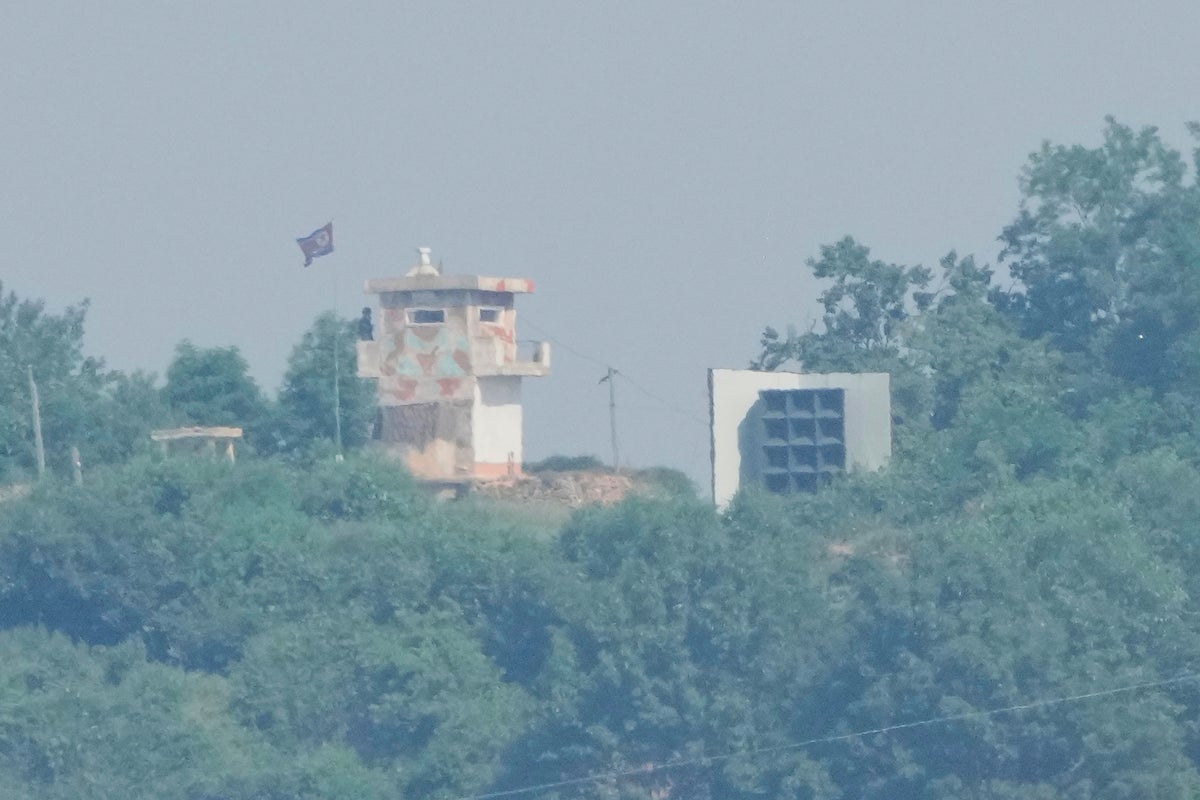
Sandra Grimes, Who Helped Unmask a C.I.A. Traitor, Dies at 79

© Nikki Kahn/The Washington Post, via Getty Images
Sandra Grimes, Who Helped Unmask a C.I.A. Traitor, Dies at 79

© Nikki Kahn/The Washington Post, via Getty Images
Rosneft’s southern oil hub on fire: drones set Russia’s Adler depot ablaze overnight
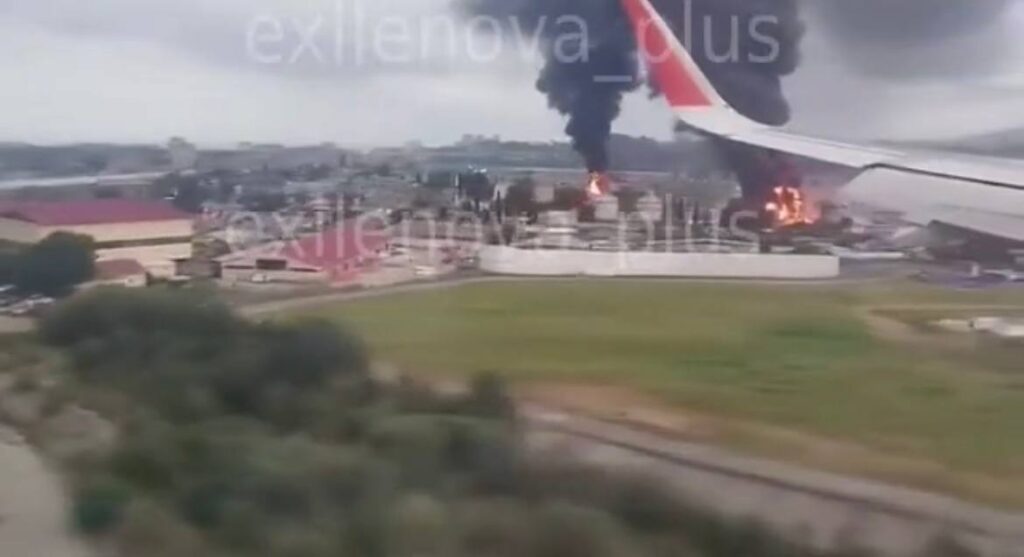
Adler oil depot burned after Ukrainian drones struck overnight, igniting a 2,000 cubic meter fuel tank near Sochi, southern Russia, around 530 km from the frontline. The strike forced a halt to flights at Sochi airport while emergency crews worked through the night to contain the blaze. The attack targeted Rosneft’s Kubannefteproduct oil depot on Aviatsionnaya Street in Adler, right next to the airport.
The oil depot includes 41 tanks with a combined capacity of around 31,200 cubic meters.
Ukrainian drones strike Adler oil depot again
In the early hours of 3 August, Ukrainian strike drones hit the Adler district of Sochi in Krasnodar Krai. Telegram channels Astra and Exilenova+ reported that the drones struck the Rosneft-Kubannefteproduct oil depot, causing a powerful fire. Local authorities confirmed the fire and the suspension of flights. The depot sits not far from the Sochi airport, which led to an immediate halt to flight operations.
Mayor Andrii Proshunin of Sochi, Krasnodar Krai Governor Veniamin Kondratiev, and Russia’s Ministry of Emergency Situations confirmed a drone attack on the depot, and the fire. They claimed that falling debris from destroyed drones caused a single tank to ignite. Footage from the site, however, shows two ignition points at the facility.
The Ministry of Emergency Situations said the fire broke out in a fuel tank with a volume of 2,000 cubic meters. They also claimed that debris from drones damaged five garages in a cooperative and a shop, which also caught fire. Governor Mikhail Kotyukov said,
“In Adler district, drone debris hit a fuel tank, causing a blaze. 127 personnel and 35 units of equipment have been deployed to eliminate the consequences of the fire.”
Flights disrupted at Sochi airport
The strike forced the closure of Sochi airport for more than two hours overnight. Airport services later announced that disruptions would continue for at least a day.
“Together with airlines, we are doing everything possible to stabilize the regular schedule as soon as possible, but it will take 1–2 days,” airport representatives said.
Drones reach Voronezh and other areas
On the same night, drones also targeted other areas. Governor Aleksandr Gusev of Voronezh Oblast claimed that 15 drones were downed over Voronezh city and Liskinsky district. Russian officials said debris from drones caused fires and damaged single-family homes. Explosions and fires were reported across Voronezh.
Exilenova+ reported that the activity of electronic warfare systems led to several dorne crashes and fires across Voronezh.
A separate fire was reported at the Kstovo oil depot in Nizhny Novgorod Oblast after a drone threat was announced in the area, though it remains unclear whether that was a result of a Ukrainian strike.
Second strike on Adler oil depots in weeks
This attack marks the second major strike on oil infrastructure in Adler in recent weeks. On 24 July 2025, Ukrainian drones struck the Lukoil-Yugnefteproduct depot, which likely supplies Sochi International Airport. That strike caused a large fire at the site.
Drone attacks on 2 August across Russia
The Adler oil depot follows a wave of Ukrainian drone attacks on 2 August across Russian territory.
- On that day, drones attacked oil refineries in Ryazan and Samara Oblast’s Novokuybyshevsk.
- Ukrainian sources confirmed that earlier attacks on Penza damaged the Elektropibor and Radiozavod plants, which produce radio-electronic equipment for the Russian armed forces.
- Ukrainian drones also struck a radar complex for monitoring space objects near Feodosia in Russian-occupied Crimea.
- The same day, drones attacked the Likhaya-Zamchalovo railway power substation in Rostov Oblast, which Russia uses to supply its occupying forces in Ukraine, and an airfield in Prymorsko-Akhtarsk that launches Shahed drones.
- Separately, on 2 August, an explosion occurred on the Central Asia–Center gas pipeline in Volgograd Oblast near the village of Dynamivske in Nekhaivsky district. The blast disabled the pipeline, and gas transit was stopped indefinitely, according to Militarnyi, citing sources in special services.
Nightly assaults become routine as Russian drones swarm Ukrainian skies, injuring civilians
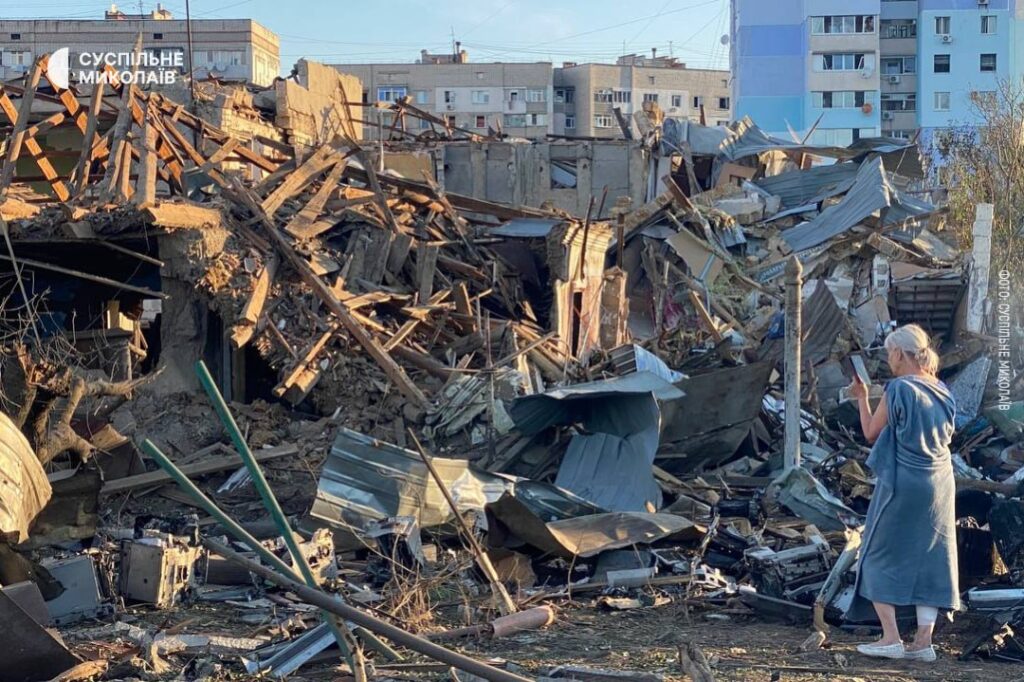
Nightly Russian drone attacks again battered Ukraine as missiles and Shaheds rained down on several cities, causing injuries and damage. Local authorities said explosions and fires struck homes and infrastructure across the country as power outages and destruction mounted.
Nightly Russian drone attacks cause destruction across Ukraine
In the late evening of 2 August, Russian forces launched missiles on Mykolaiv and Kherson. The State Emergency Service reported that in Mykolaiv explosions destroyed single-family homes and damaged apartments, igniting fires in a residential district.
The head of Mykolaiv Oblast, Vitalii Kim, said seven people were injured, with four treated on site and three hospitalized. A 57‑year‑old man and a 74‑year‑old man were hospitalized in moderate condition, and a 32‑year‑old man received outpatient care. Kim confirmed that three houses were destroyed, 23 more were damaged, and 12 apartment buildings, six vehicles, a postal branch and a building materials store were also hit. After the attack, parts of Mykolaiv Oblast lost electricity. The head of Kherson Oblast, Oleksandr Prokudin, also reported power outages after evening missile explosions.
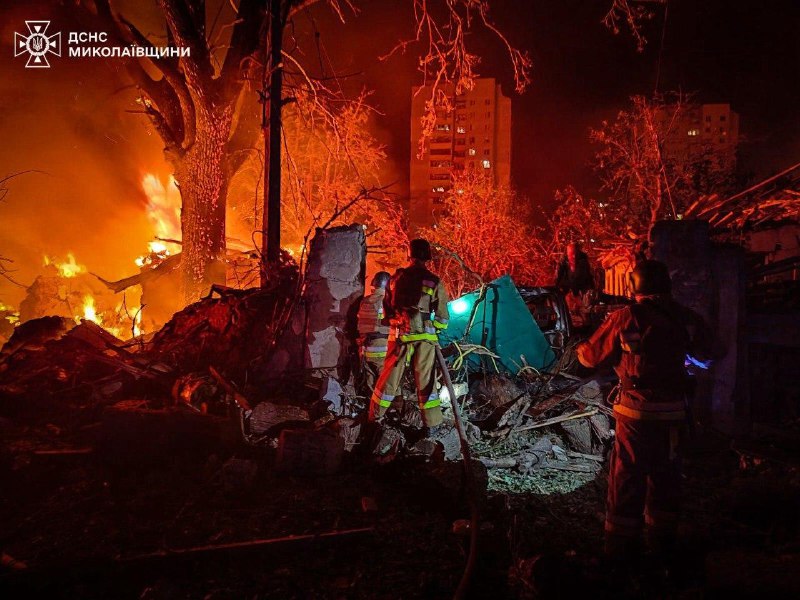
Russian forces struck Kharkiv in the night with two Shahed drones. Oleg Synehubov, the head of Kharkiv Oblast, reported that a central district of the city was hit. Mayor Ihor Terekhov said one explosion damaged warehouse buildings near residential areas, with no injuries there. Another drone fell in a forest without detonating.
Synehubov said that explosions in Chuhuiv and Balakliia caused fires in detached homes. In Chuhuiv, Mayor Halyna Minaieva said three women suffered acute stress reactions, and houses had windows and roofs damaged. In Balakliia, city military administrator Vitalii Karabanov said more than ten drones struck one street, setting over ten homes on fire. He confirmed at least one injured person. Casualty numbers there are still being clarified.
In Kyiv, city military administration chief Tymur Tkachenko confirmed a missile strike during the night, with details still unknown.
Lithuanian volunteer organization Blue/Yellow says that Russia’s previous attack on 31 July destroyed its Kyiv warehouse. Lithuanian broadcaster LRT reported that a Shahed drone completely demolished the building used for storing humanitarian aid before shipment to the front. The organization said the warehouse contained mainly helmets and protective vests and that surrounding buildings were also damaged.
Heavy Ukrainian air defense effort
The Air Force of Ukraine reported that between 19:00 on 2 August and early 3 August, Russia attacked with 76 Shahed and decoy drones, and seven missiles, including an Iskander‑M ballistic missile, five S‑300/S‑400 surface‑to‑air missiles used for ground attacks, and one Kh‑22 cruise missile.
Ukrainian air defenses shot down or suppressed 61 air targets: 60 drones and one ballistic missile. Despite this, six missiles and 16 drones struck eight locations, with debris falling in two more places. Air defense units, aviation, radio‑electronic warfare systems and mobile fire teams all took part in repelling the assault.
Casualties from artillery in Kostiantynivka
On the morning of 3 August, Russian forces used artillery against Kostiantynivka in Donetsk Oblast. City military administrator Serhii Horbunov reported that shells hit residential areas, killing one person. He said that Russian troops struck civilian infrastructure and confirmed that the attack resulted in at least one death.
Long-Dormant Russian Volcano Erupts for the First Time in Centuries

© Igor Shpilenok
The Hill: US senators chose a break, leaving Russia sanctions power in Trump’s hands

US lawmakers skipped a Russia sanctions vote and left the sanctions in Trump’s hands as his 8 August deadline approaches. The Hill says the Senate left Washington for its August break without advancing a sweeping sanctions bill aimed at Moscow, leaving the president to decide how to confront Vladimir Putin over the war in Ukraine.
Senate exits after Trump’s ultimatum to Russia
The Hill reports that Trump warned that Putin has until 8 August to stop the war in Ukraine or face tariffs on countries that continue buying Russian oil. As a preview of this pressure, he imposed a 25% tariff on India, a major buyer of Russian energy. That is far below the 500% tariffs proposed in the stalled bill. Some senators admit that leaving the bill untouched puts the responsibility entirely on the president for now.
Republican senators say they expect Trump to act decisively. Republican Senator Mike Rounds said to The Hill that Trump is now disappointed in Putin. Democrats doubt that Trump will go as far as needed, though they acknowledge that his tone has grown tougher. Trump earlier described Russia’s air attacks on Ukraine as disgusting and said his team is ready to impose sanctions.
Submarines, tariffs, and diplomacy
In response to threats of nuclear weapons from Russia’s former President Dmitry Medvedev, Trump ordered nuclear submarines to the region. Trump told reporters that his envoy Steve Witkoff will visit Russia after a trip to Israel. He stressed that he will impose sanctions but admitted he is unsure if they will change Moscow’s behavior.
Senate hawks frustrated by inaction on Russia sanctions
The blocked bill was designed to hit Russia’s oil revenues hard by imposing tariffs on countries that keep buying Russian crude. Analysts at the Center for Strategic and International Studies argue that oil revenue is key to funding Moscow’s war. Supporters of the bill say a missed opportunity weakens the message.
Democrat Senator Richard Blumenthal, coauthor of the bill with Republican Lindsey Graham, said he would see it as a success if Trump imposed even a part of the planned tariffs.
Early signs of impact
Indian oil refiners have already paused imports of Russian oil after Trump’s 25% tariff announcement.
Graham said Trump has now adopted the idea of targeting countries that buy Russian oil. He added that Trump can act either through executive action or with the help of the bill if it passes later.
Putin Widens Effort to Control Russia’s Internet

© Dimitar Dilkoff/Agence France-Presse — Getty Image
Food Stamp Cuts Could Deal a Blow to Small Grocers

© Jessica Attie for The New York Times
Russia tries “total infiltration” in Pokrovsk — Ukraine boosts fortifications inside the city, Syrskyi says
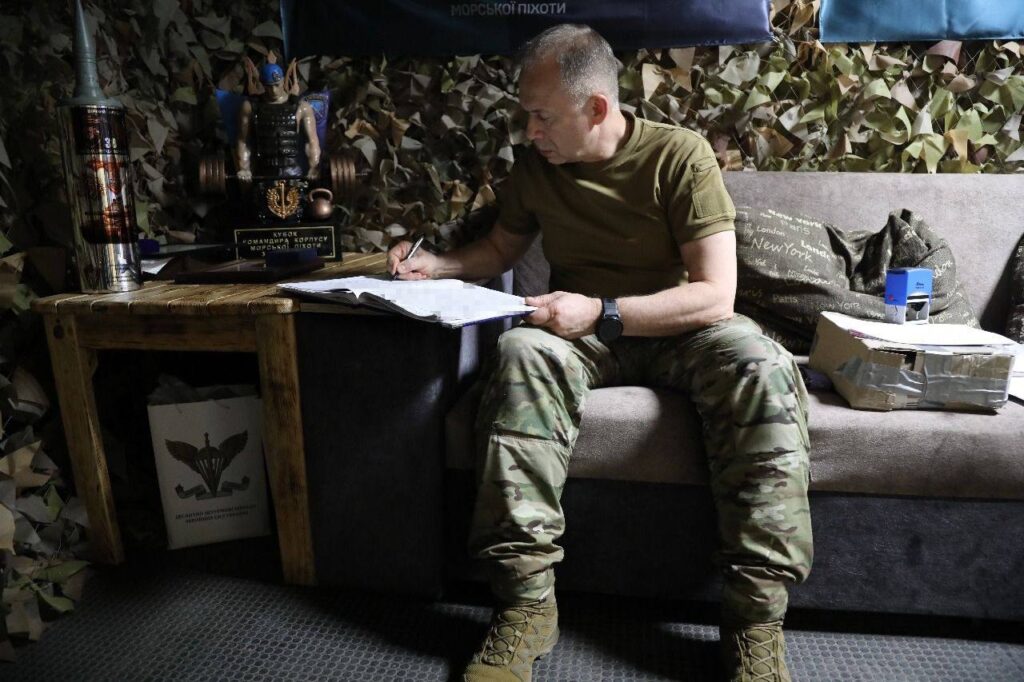
Russia’s total infiltration in Pokrovsk has failed as Ukraine’s top general Syrskyi says Russian attempts to slip inside were stopped fast. The commander-in-chief described how the army adapts to this tactic on several threatened directions and why the Pokrovsk sector in eastern Ukraine’s Donetsk Oblast remains one of the most difficult areas.
Donetsk Oblast has remained Russia’s main focus for many months, with the fiercest fighting and the largest concentration of its troops taking place there. This year, Russia has largely shifted from its infamous “meat-wave” frontal assaults to tactics based on small groups. Instead of large-scale offensives, Russian forces now send numerous teams of only a few soldiers each to probe for weak spots in defenses. Once a position is taken, reinforcements are brought in to expand and secure the gain.
Ukraine blocks total infiltration in Pokrovsk
Syrskyi wrote on Facebook on 2 August that Russian forces try a tactic of the so-called “total infiltration,” aiming to push through defenses without a large assault. He said these efforts include hidden movements toward Pokrovsk and other parts of Donetsk Oblast. According to him, these infiltration moves have been crushed before they reach their targets.
Syrskyi explained that he spent the day visiting all command posts of the Armed Forces and National Guard units holding the Pokrovsk direction. He said he met the commander of drone forces, corps commanders, and brigade commanders. During these meetings, they reviewed the battlefield conditions and planned how to strengthen defenses in areas where Russian pressure is growing.
The general said the situation is currently most dangerous on Pokrovsk, Dobropillia, and Novopavlivka directions. Russian forces seek weak spots, intensify their activity, and try to capture important Ukrainian urban areas. Syrskyi said Ukraine is countering total infiltration with special mobile reserves, whose role is to search for and destroy these teams before they can create problems inside the lines.
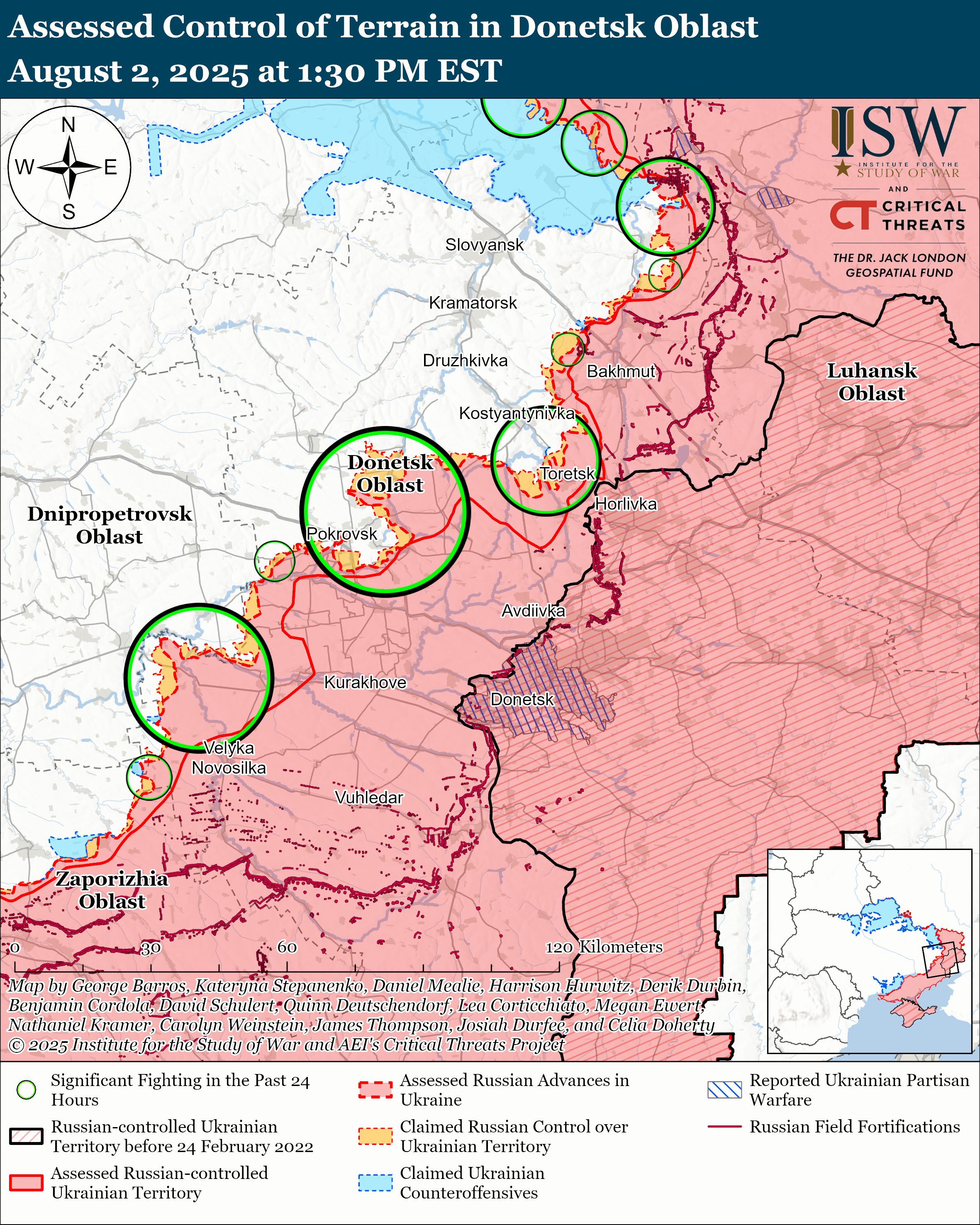
He stressed that the focus remains on improving fortifications. Syrskyi discussed with commanders how to reinforce positions with engineering work, minefields, barriers, and underground structures that protect against drones. He said this work continues but must be more active, broad, and complex.
Advancements
The US-based Institute for the Study of War (ISW) noted in its 2 August daily reports that “Ukrainian forces recently advanced near Novopavlivka and in western Zaporizhzhia Oblast, and Russian forces recently advanced near Toretsk.”

Thanks to your incredible support, we’ve raised 70% of our funding goal to launch a platform connecting Ukraine’s defense tech with the world – David vs. Goliath defense blog. It will support Ukrainian engineers who are creating innovative battlefield solutions and we are inviting you to join us on the journey.
Our platform will showcase the Ukrainian defense tech underdogs who are Ukraine’s hope to win in the war against Russia, giving them the much-needed visibility to connect them with crucial expertise, funding, and international support.
We’re one final push away from making this platform a reality.
No Passports, No Study Abroad: China Limits Public Employees’ Travel

© CFOTO/Future Publishing, via Getty Images
Newsom Wants to Gerrymander California. Schwarzenegger May Disagree.

© Rod Lamkey/Associated Press
US, Russia may prepare for show of force as Trump raises stakes with nuclear submarines

The US raises the stakes amid Russia’s threats. In response to Moscow’s threats, American President Donald Trump ordered the deployment of two nuclear submarines closer to Russia. The Times reports that this is not just a show of force but a personal message to Russian President Vladimir Putin.
After former Russian President Dmitry Medvedev’s statements, who on 31 July referenced the Soviet automatic nuclear strike system “Dead Hand” in the context of threats against the US, Trump ordered the deployment of two nuclear submarines. His threats came after Trump’s 10-day ultimatum that the US gave to Russia to end the war in Ukraine.
This exchange significantly escalated nuclear rhetoric between the two powers, underscoring the growing intertwining of the Ukraine war with nuclear deterrence.
US nuclear submarines head toward Russia
The American president responded in his trademark style — tough and theatrical. In a Truth Social post, Trump announced the relocation of two nuclear submarines to relevant regions.
This move is not just a military maneuver but a strategic political signal. Trump is responding less to Medvedev’s rhetoric and more to Russian President Vladimir Putin’s rejection of Trump’s ceasefire proposal in Ukraine.
After the strike on Kyiv that killed 31 people, including five children, Putin confirmed that Russia’s conditions for ending the war, announced back in summer 2024, remain unchanged. He added that Russia is ready to wait until Ukraine agrees to Moscow’s conditions.
Among them are:
- The withdrawal of Ukrainian troops from the occupied territories of Donetsk, Luhansk, Kherson, and Zaporizhzhia
- Ukraine’s refusal of NATO membership
- Ukraine’s non-nuclear status
- Sanctions’ lift
What does the submarine deployment mean?
The US possesses 71 nuclear-powered submarines, including 14 Ohio-class ballistic missile subs, each capable of carrying up to 20 Trident II nuclear warheads. At any given moment, 8 to 10 of them are at sea. The White House said that this is not provocation but deterrence.
Sanctions, tariffs, and the energy war
In addition to military signals, Trump threatens secondary sanctions against buyers of Russian energy. India is already feeling the heat — partial tariffs of 25% have been imposed. In the danger zone are China and Brazil, which remain key importers of Russian gas.
These statements show that Trump’s policy toward Russia is rapidly changing, and the US pressure against Moscow is also increasing.
“They broke all 10 rules”: Ukraine calls to eject Russia from OSCE
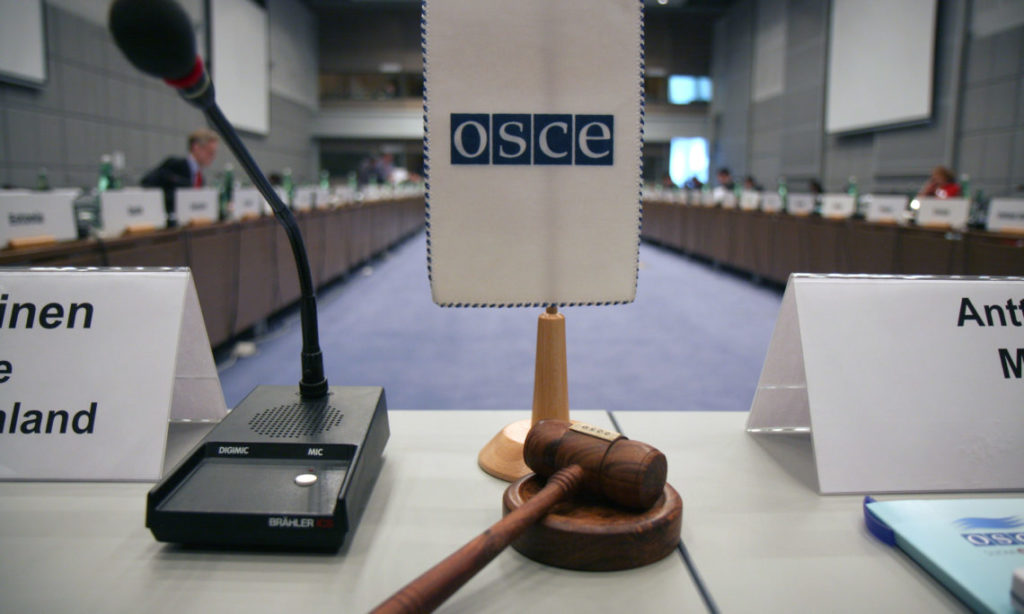
Moscow is blocking the organization’s work, which was supposed to monitor its war crimes in Ukraine. Ukrainian Foreign Minister Andrii Sybiha states that Russia should no longer be a member of the Organization for Security and Cooperation in Europe (OSCE), UkrInform reports.
According to him, Moscow is obstructing the OSCE’s activities because the organization’s mission was to document numerous violations of international law, including Russia’s war crimes.
“A country that has violated all ten fundamental principles of the Helsinki Act should not hold a place in this organization,” Sybiha emphasizes.
What are the Helsinki Act principles?
The Helsinki Act of 1975 is not a legally binding treaty but a political document containing key norms of international law that form the basis of European security. The ten principles include:
- Sovereign equality of states
- Refraining from the threat or use of force
- Inviolability of frontiers
- Territorial integrity of states
- Peaceful settlement of disputes
- Non-intervention in internal affairs
- Respect for human rights and fundamental freedoms
- Equal rights and self-determination of peoples
- Cooperation among states
- Fulfillment of obligations under international law
Russia has systematically violated these principles since annexing Crimea in 2014, conducting the war in Donbas, and, since 2022, waging all-out war. These violations include illegal use of force, breaches of Ukraine’s territorial integrity, interference in internal affairs, and gross human rights abuses, including war crimes.
Ukraine insists on reform
Sybiha reminds that the OSCE was created in very different geopolitical circumstances during the Cold War, but today, Russia has turned the organization into a tool for advancing its own interests.
In 2022, Russia blocked the extension of the mandate of the OSCE Special Monitoring Mission in Ukraine, which had previously operated in Donbas. Since then, the OSCE supports Ukraine through other programs but without a direct presence in combat areas.
“It cannot be that one country blocks the work of the entire organization, which aims to enhance security. Russia is the main cause of instability in Europe,” the minister stresses.
Ukraine insists on reforming the OSCE and expelling the aggressor country from its membership to restore the organization’s trust and effectiveness.
Ukrainian foreign minister says 70% of Russia’s shadow oil fleet passes under NATO’s nose

Europe has a chance to strike at the Kremlin’s lifelines, if it dares to act. Around 70% of the “shadow fleet” transporting Russian oil sails through the Baltic Sea, said Ukrainian Deputy Foreign Minister Andrii Sybiha at a joint press conference with Polish Foreign Minister Radosław Sikorski, UkrInform reports.
The Russian “shadow fleet” consists of grey-market tankers that evade international sanctions. These tankers often sail with transponders turned off, without proper insurance, and conceal their identities. This fleet channels Russian oil exports to China, India, and Global South countries, helping Moscow fund its war. Shutting down this corridor, through port controls and insurance restrictions, could deal a serious blow to the Kremlin’s energy revenues.
“Let me remind you that about 70% of the shadow fleet that transports Russian oil passes through the Baltic Sea. There’s still untapped potential here, in my view, among our European partners — particularly the Baltic Sea states,” Sybiha emphasized.
Sanctions must target not just oil, but war criminals too
Sybiha also urged Western partners to impose targeted individual sanctions on Russian officials involved in the abduction of Ukrainian children and unlawful sentences against Ukrainian POWs.
Poland’s leadership role in the Baltic region
With Poland set to chair the Council of the Baltic Sea States, Sybiha said Warsaw has a chance to spearhead efforts to dismantle the Kremlin’s shadow oil network.
“Now is the time for active diplomacy, pressure, and accountability,” he stressed.
The informal gathering of the Ukrainian and Polish foreign ministers took place at Sikorski’s residence in Kobylniki, in Poland’s Kuyavian-Pomeranian Voivodeship. Discussions covered a wide range of topics, from international support for Ukraine to humanitarian issues and protecting Ukrainian citizens.
Central Asia gas route to Russia disrupted after Volgograd explosions
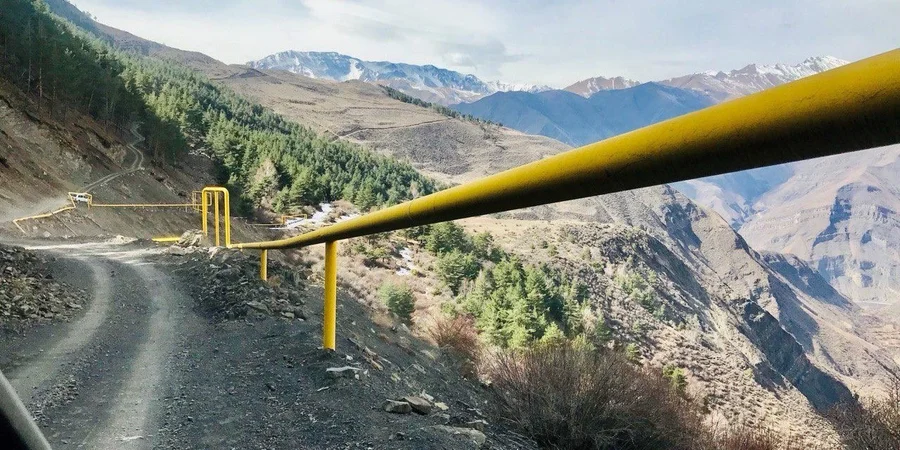
The Central Asia-Centre gas pipeline system has been taken out of service following explosions in Russia’s Volgograd region on 2 August, Ukrainian media hromadske reported, citing a source in law enforcement structures.
The pipeline system, owned by Gazprom, transports natural gas from Turkmenistan through Uzbekistan and Kazakhstan to Russia.
Local residents report that law enforcement agencies and repair crews are present in the area of Dinamovskoye village in the Nekhayevsky district of Volgograd Oblast to eliminate the consequences of the explosion, according to the source.
This pipeline reportedly provides energy to such objects of Russia’s military-industrial complex as Demikhovsky Machine-Building Plant, Russian Aircraft Corporation MiG (production complex No. 1), ammunition manufacturing plant Magnum-K and others.
These complexes are key components of Russia’s military-industrial complex, with the pipeline supplying them reported to provide energy to support their operations.
Representatives of the Russian gas transportation company that supplies the Russian army are currently calculating damages, the report said. Gas transportation through the Central Asia-Centre main pipeline in Volgograd Oblast has been suspended indefinitely.
The report doesn’t specify whether the explosions were caused by a drone attack.
Russian Telegram channels reported explosions and fires at industrial facilities across multiple oblasts during overnight drone attacks on 2 August, with air defense systems activated in several areas.
The Ukrainian Security Service (SBU) confirmed strikes on two targets: a military airfield storing Iranian-made Shahed drones in Primorsko-Akhtarsk, Krasnodar Oblast, and the Elektroprilad plant in Penza. The Ukrainian Armed Forces General Staff confirmed the Penza strike.
The Elektroprilad facility produces military equipment including gear for digital networks in command systems, aviation devices, armored vehicles, ships, and spacecraft, the SBU кузщкеув.
Read also
Lithuanian military recovers mysterious drone 100km from Belarus border after five-day search

A drone that crossed into Lithuania from Belarus on 28 July has been located at the Gajžiūnai military training ground in Jonava district, the Belarusian service of Radio Free Europe/Radio Liberty reported.
Lithuania’s Defense Minister Dovile Sakaliene confirmed the discovery to the Baltic News Service (BNS).
The unmanned aircraft was discovered more than 100 kilometers from the Belarusian border. The drone resembles the Russian “Gerbera” decoy drone, designed to deceive air defense systems by mimicking the Iranian Shahed combat drone, according to earlier reports.
Military investigators and bomb disposal experts are working at the site where the drone was found.
On the morning of 28 July, Lithuanian police warned citizens about the intrusion of an unidentified unmanned aircraft from Belarusian territory. Darius Buta, chief advisor of the National Crisis Management Center (NKVC), told the news portal Delfi that the drone was detected at an altitude of approximately 200 meters and was last seen near Vilnius.
Drone incidents
On 10 July, State Border Service personnel spotted an unknown object in the air flying at approximately 100 meters altitude at 50-60 km/h speed. Within minutes, it crashed near the closed Sumskas checkpoint, about one kilometer from the Belarus border. The object was identified as a Russian “Gerbera” type drone.
On 28 July, Lithuanian police reported detecting an unidentified drone type that entered the country from Belarus territory. Social media footage showing the drone suggests it resembles a Shahed or its Russian imitation “Gerbera,” according to Delfi, though the drone type is still being determined.
Belarus is a key ally of Russia, primarily due to their deep military, political, and economic cooperation. The country allowed Russian troops to use its territory for military operations, including during the 2022 full-scale invasion of Ukraine, and hosts some Russian tactical nuclear weapons.
Lithuania will deploy a Ukrainian-developed acoustic drone detection system starting in 2026, the country’s Armed Forces Commander-in-Chief Raimundas Vaiknoras announced to LRT.
The deployment announcement comes after another incident involving a drone entering Lithuanian airspace. When asked whether Lithuania would have an acoustic drone detection system, Vaiksnoras confirmed that budget funds have already been allocated for purchasing the systems.
According to the Armed Forces chief, testing will be conducted by the end of the year, and next year there will be more intensive implementation of these systems.
“They have been known since last autumn, but procedural issues were somewhat delayed because this is a Ukrainian system, one could say, which had to be adapted to our implementation of American systems due to sensitive issues,” Vaiksnoras said.
The general noted that two drones that flew into Lithuania the day before “are not a coincidence.”
“It seems to me that we sometimes forget that we actually live very close to the combat zone. Belarus is used as a platform for Russia’s attack on Ukraine, so drones moving through our territory are the same thing that Poles, Romanians, and Latvians experience. This situation will not change while Ukraine is under attack by Russia,” the Armed Forces chief added.
Read also
SBU drones strike Shahed depot in Krasnodar used to launch attack drones against Ukraine
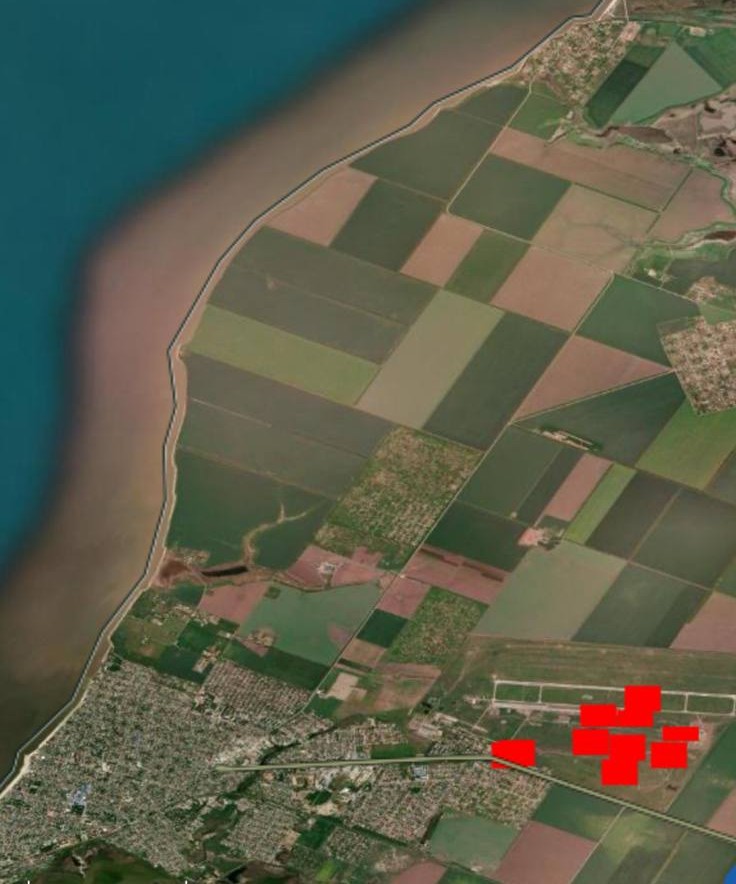
Ukrainian Security Service (SBU) drones struck a military airfield storing Iranian-made “Shahed” drones in Primorsko-Akhtarsk, Krasnodar Oblast, during the night of 2 August, the SBU press service reported.
The SBU said that the Primorsko-Akhtarsk military airfield became the first target for long-range UAVs. “Storage and launch sites for Shaheds that attack Ukraine were hit on its territory,” the service announced. Fires broke out in the airfield area following the drone strikes.
A second target was the Elektroprilad plant in Penza city, with the Ukrainian Armed Forces General Staff confirming the strike. The facility produces equipment for the Russian military-industrial complex, manufacturing gear for digital networks in military command systems, aviation devices, armored vehicles, ships, and spacecraft, according to the SBU.
“SBU drones successfully hit the target, with smoke observed in the explosion area,” the security service reported regarding the Penza strike.
The attacks represent a continuation of Ukrainian strikes on Russian military infrastructure. On 31 July, drones had previously targeted a radio plant in Penza, with the SBU later confirming responsibility for that operation as well.
The coordinated strikes demonstrate Ukraine’s expanding capability to conduct long-range operations against military targets deep within Russian territory, specifically targeting facilities involved in producing or storing weapons used against Ukrainian cities.
Multiple Russian oblasts reported explosions and fires at industrial facilities during overnight drone attacks on 2 August, with air defense systems activated across several areas, according to Russian Telegram channels.
Samara Oblast Governor Vyacheslav Fedorishchev confirmed strikes on Novokuybyshevsk. Social media footage showed a large fire at what appeared to be the Novokuybyshevsk Oil Refinery.
Witnesses reported loud explosions near Dyagilevo airfield in Ryazan Oblast. Another oil refinery in Ryazan city was reportedly struck.
Residents of Lipetsk and Voronezh oblasts also reported UAV attacks and air defense activity during the night.
Read also
Donor List Suggests Scale of Trump’s Pay-for-Access Operation

© Jason Andrew for The New York Times
